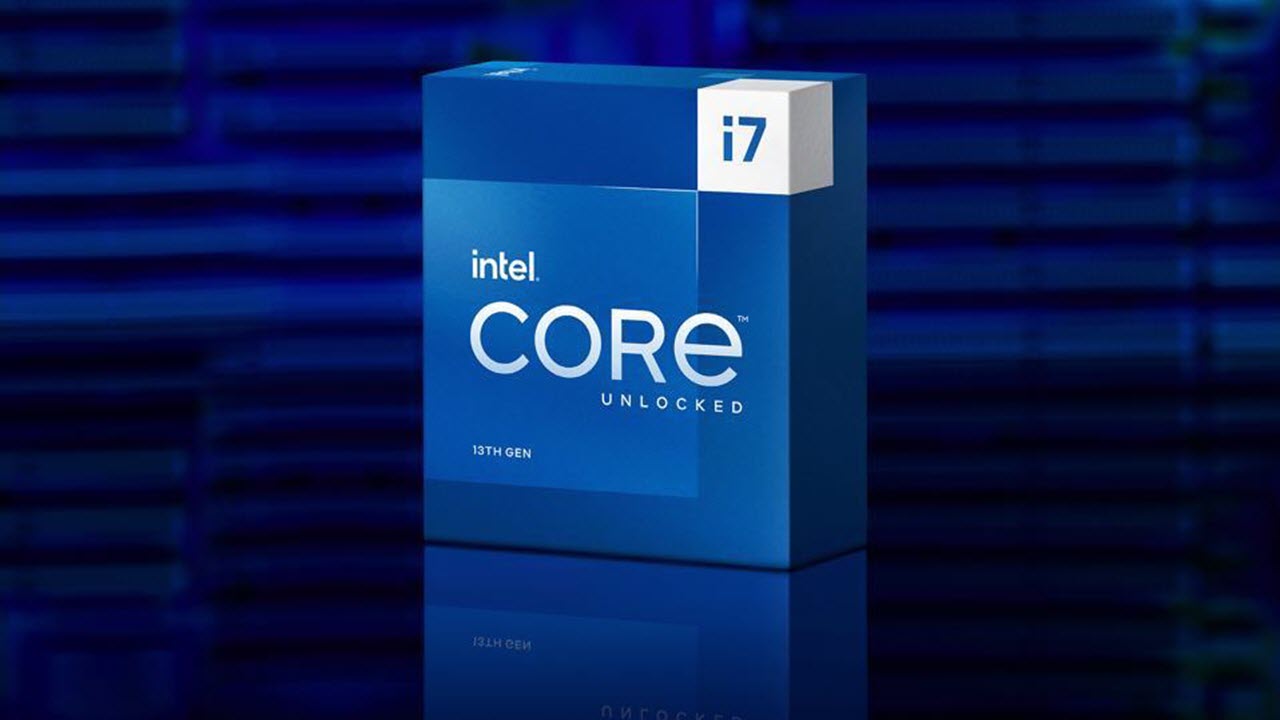Why you can trust Tom's Hardware
Productivity Benchmarks on Core i7-13700K — The TLDR:
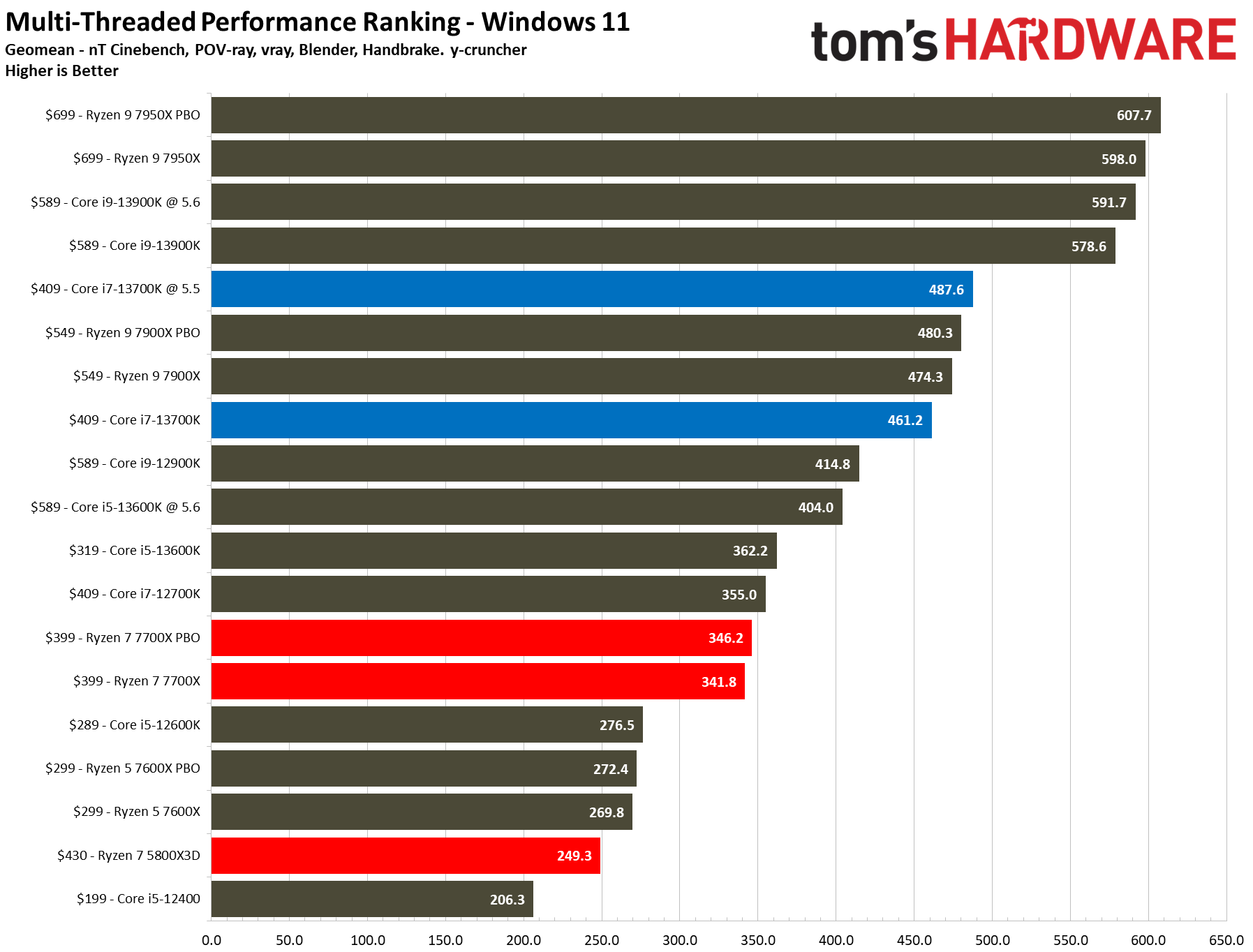
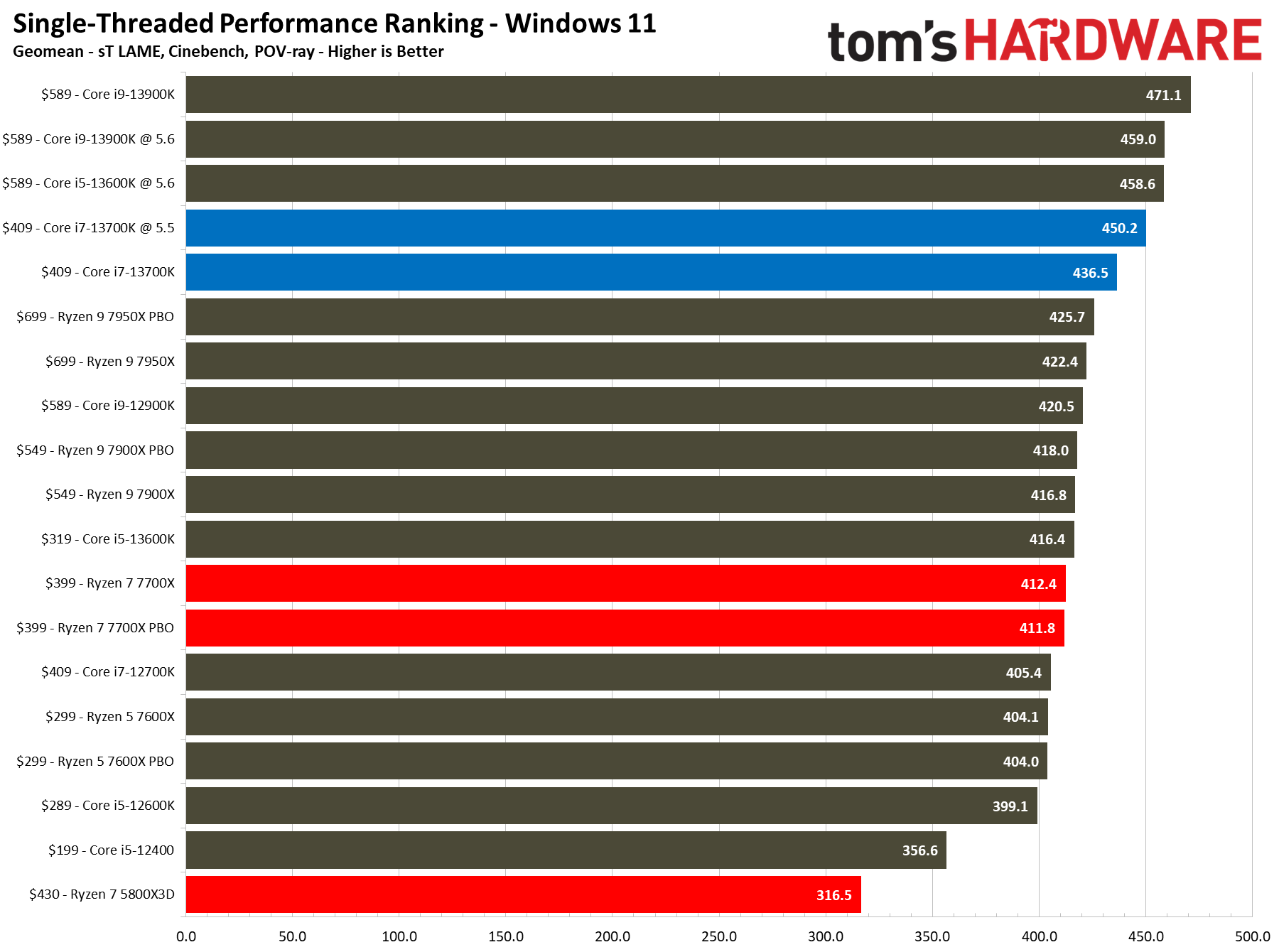
We generate these cumulative measurements from the geometric mean of the most important application benchmarks in our selection of tests below. These results give a good indication of performance and the trends you can expect overall. We include performance with overclocked configurations in this overall view, but to simplify our charts, we only include a few overclocked results in the individual tests below.
The Intel models all profit heavily from overclocking in threaded work, but we see smaller improvements in single- and multi-threaded applications from overclocking the Ryzen chips. We see big gains in single-threaded work for the overclocked Core i7-13700K, while the overclocked Core i9-13900K sees a slight reduction in single-threaded results, due to the 5.6 GHz all-core overclock, which is actually slower than the native 5.8 GHz boost.
The $409 Core i7-13700K is 35% faster in multi-threaded work than the $399 Ryzen 7 7700X, which is a surprising advantage given AMD's traditional lead in these types of workloads. After overclocking, the Core i7-13700K is 40% faster than the overclocked 7700X. The 13700K also delivers an impressive 30% gain over the previous-gen 12700K.
The Ryzen 9 7900X commands a $150 premium over the 13700K but is only 3% faster in multi-threaded work, highlighting AMD's need for a drastic price adjustment.
The 13700K shines in lightly-threaded work, too. At stock settings, the 13700K is 6% faster than the 7700X, and 9% faster after overclocking. The 13700K even beats AMD's fastest single-threaded chip, the Ryzen 9 7950X, by 4%.
You'll have to accept severe performance tradeoffs if you opt for AMD's fastest gaming chip, the Ryzen 7 5800X3D. For instance, the Core i7-13700K is 84% faster in threaded work and 38% faster in single-threaded work. The 5800X3D is significantly slower than the newer chips because it comes with the previous-gen Zen 3 architecture, and the extra dollop of L3 cache doesn't impart any meaningful speedups in most standard desktop PC applications.
| Tom's Hardware | Multi-Thread | Single-Thread |
| $699 — Ryzen 9 7950X | 100% | 89.66% |
| $589 — Core i9-13900K | 96.8% | 100% |
| $549 — Ryzen 9 7900X | 79.3% | 88.49% |
| $409 — Core i7-13700K | 77.1% | 92.7% |
| $319 — Core i5-13600K | 60.6% | 88.4% |
| $399 — Ryzen 7 7700X | 57.2% | 87.6% |
| $299 — Ryzen 5 7600X | 45.1% | 85.8% |
| $430 — Ryzen 7 5800X3D | 41.7% | 67.2% |
Rendering Benchmarks on Intel Core i7-13700K
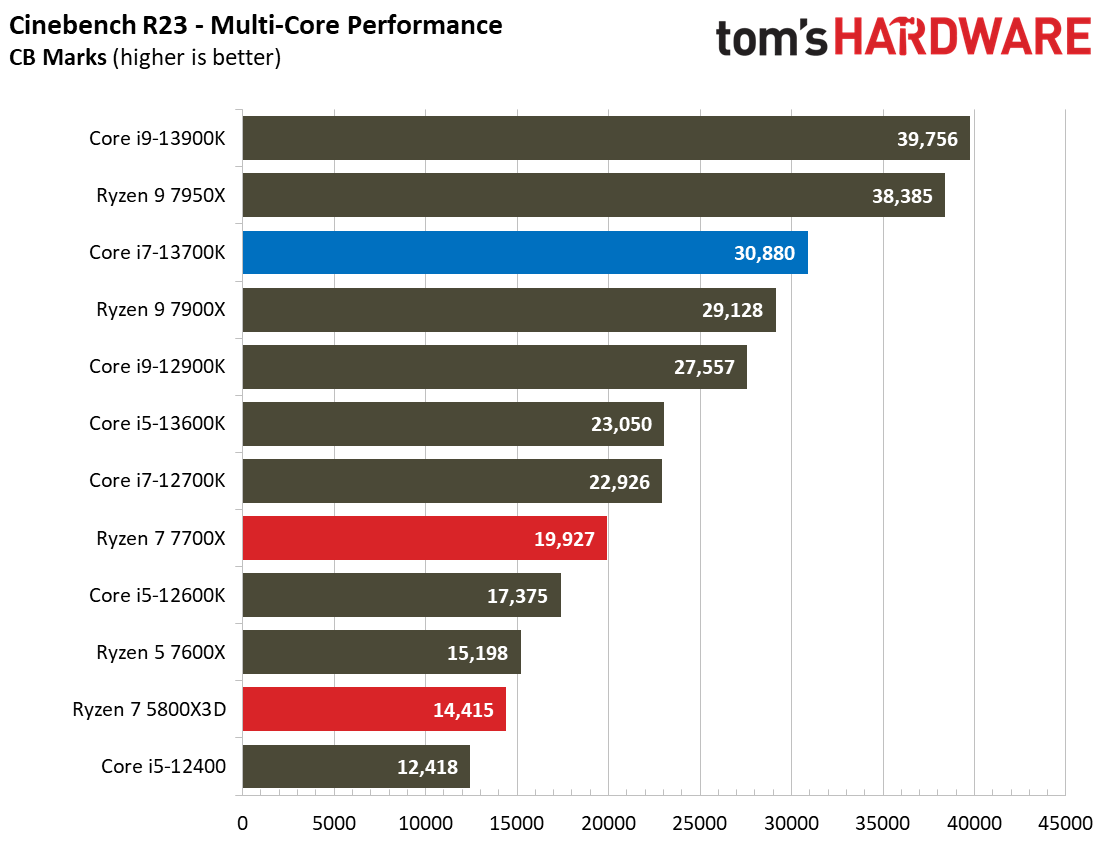
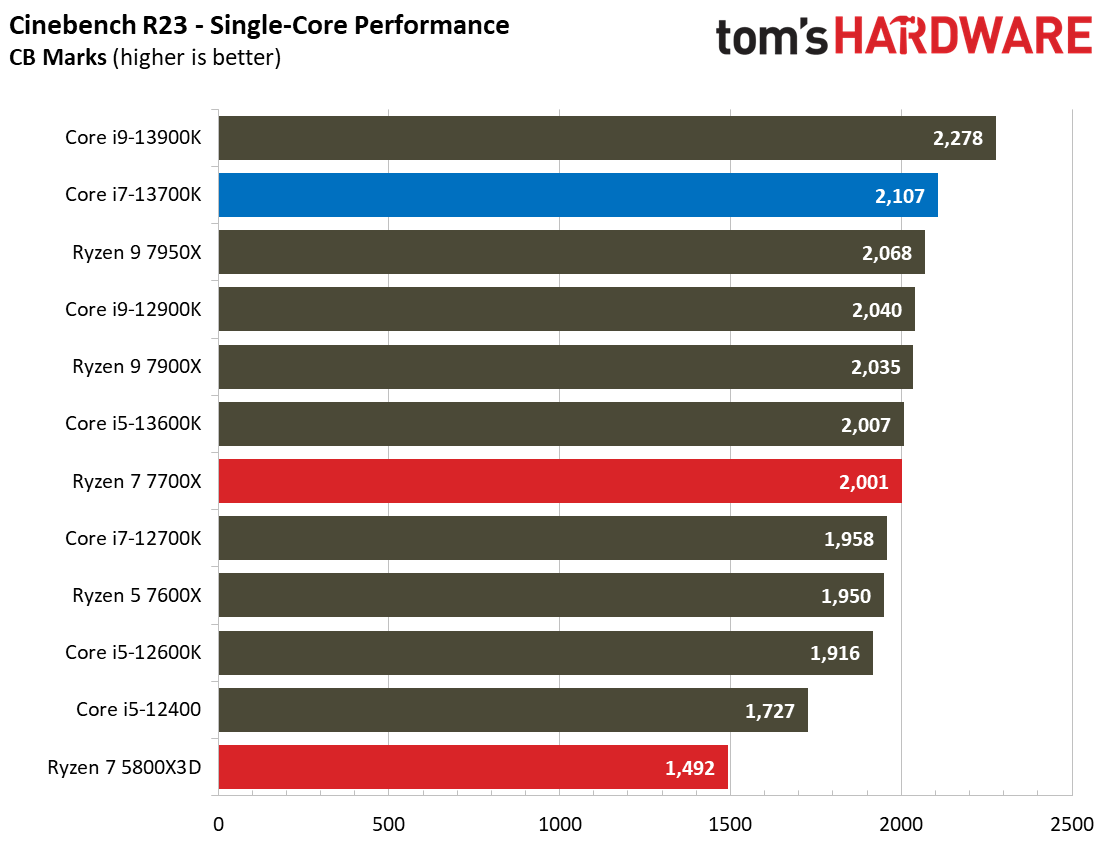
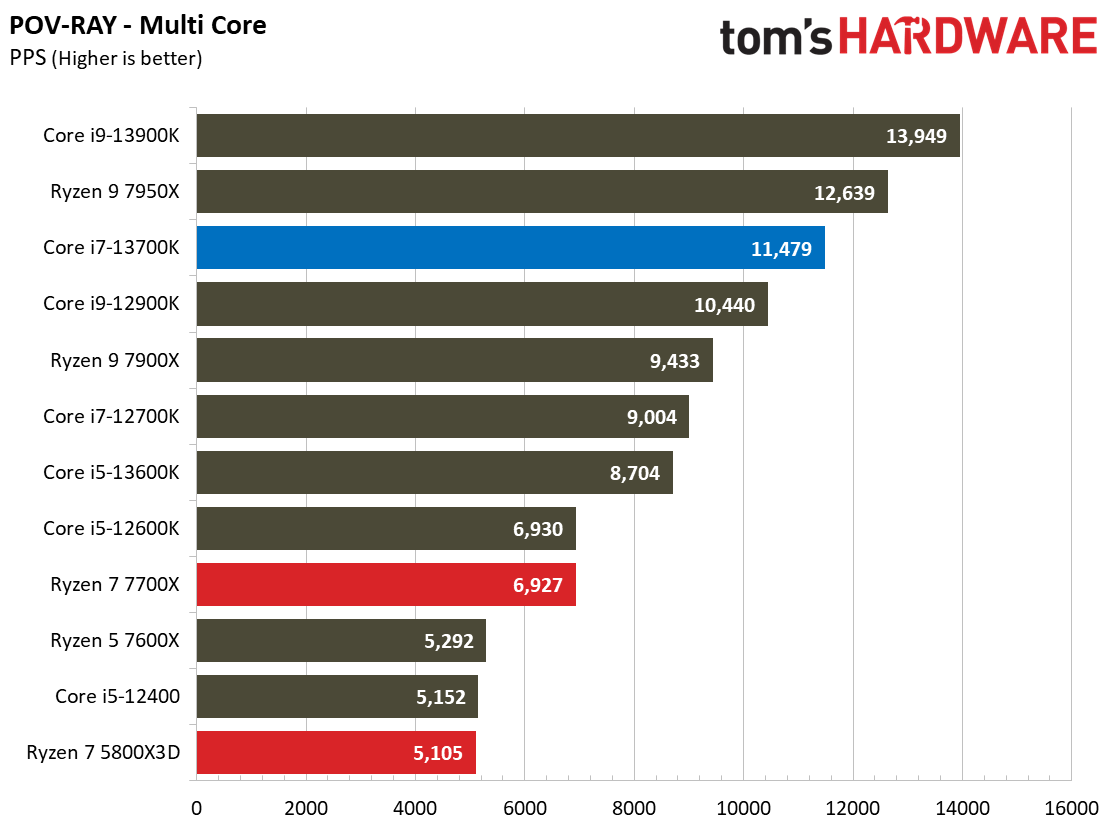
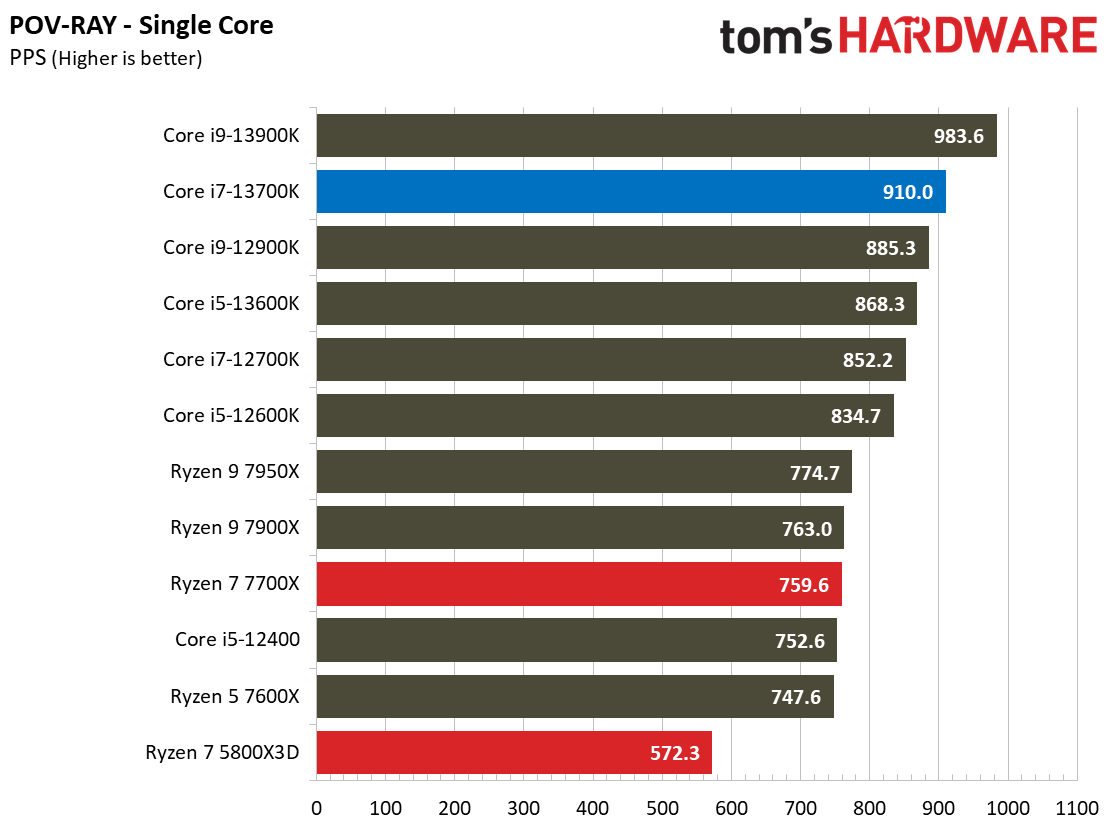
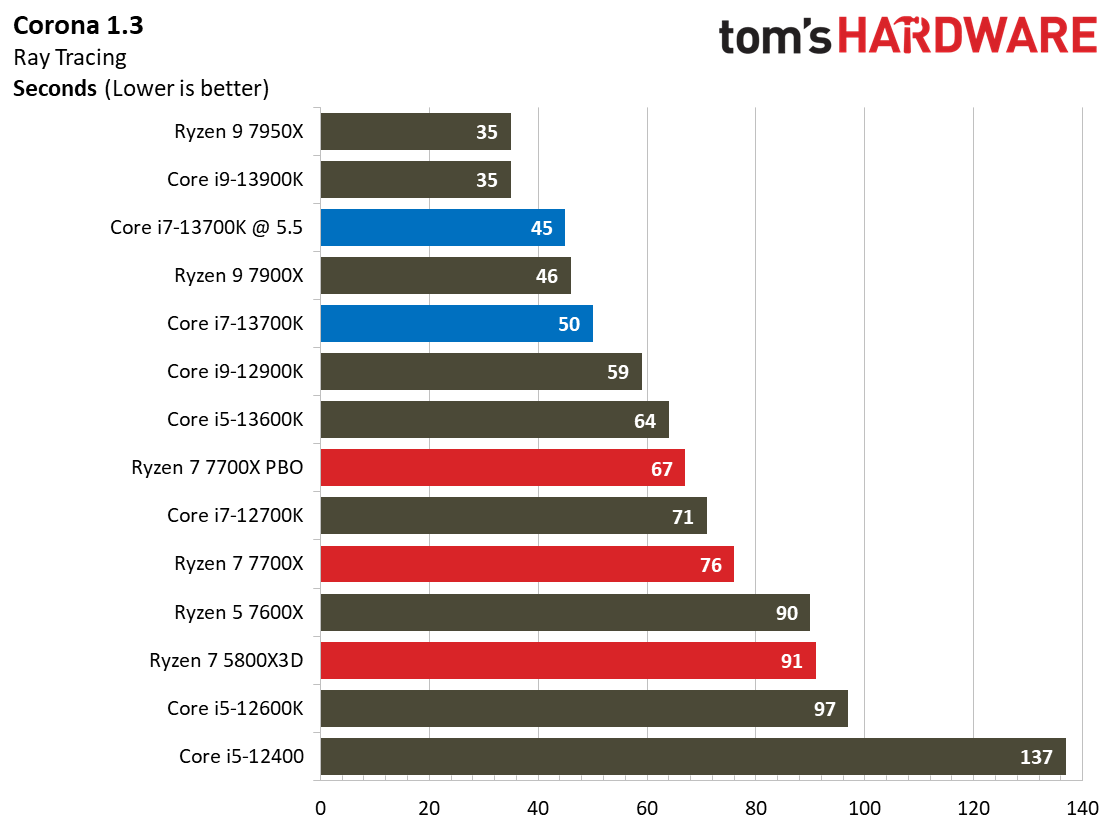
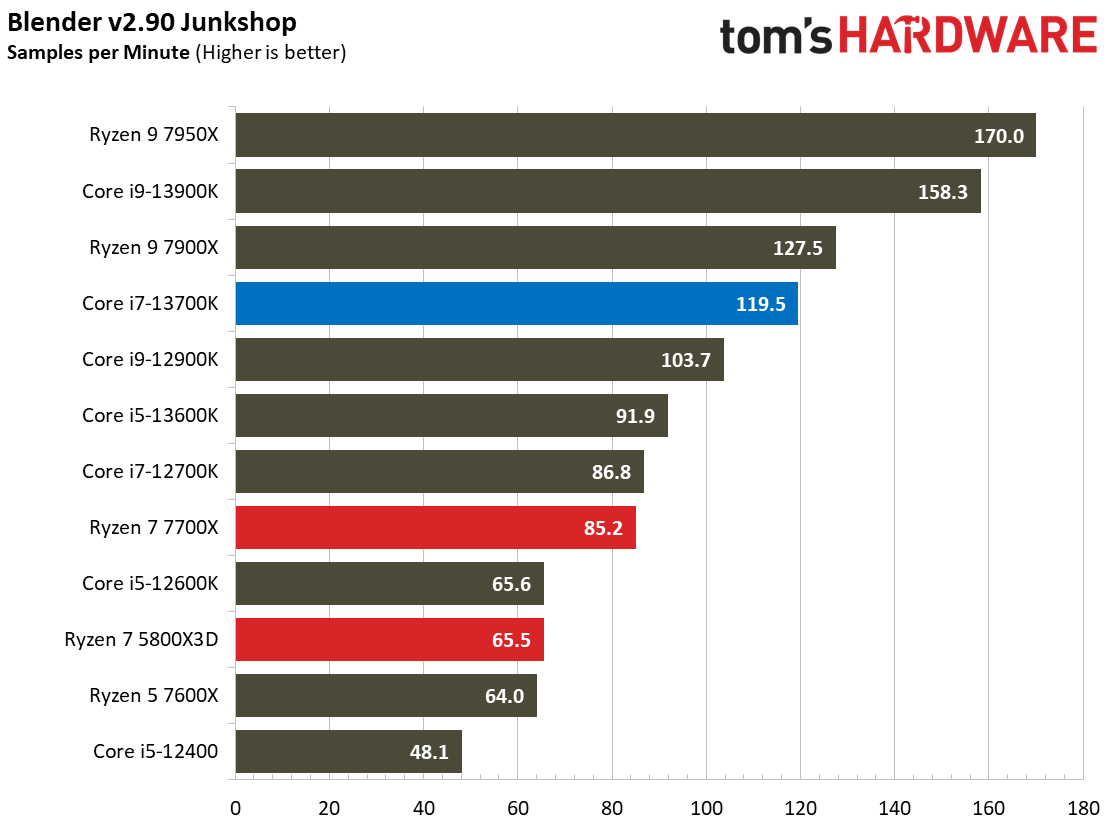
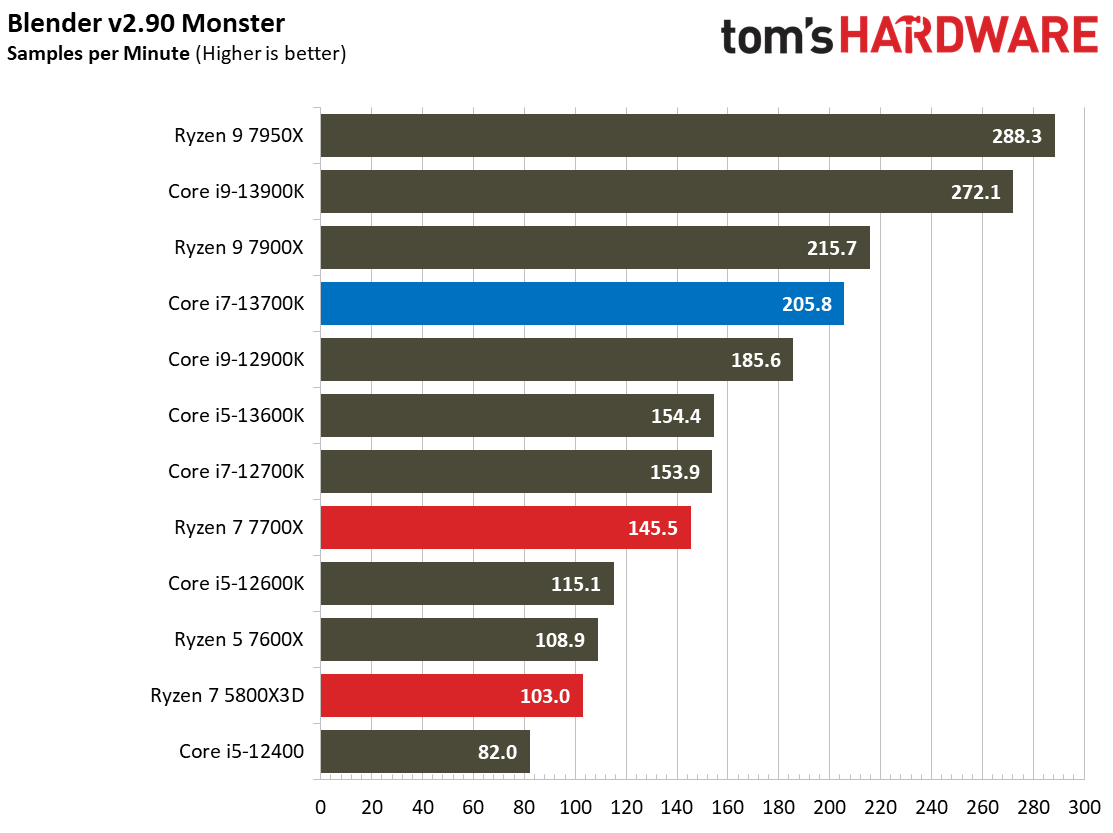
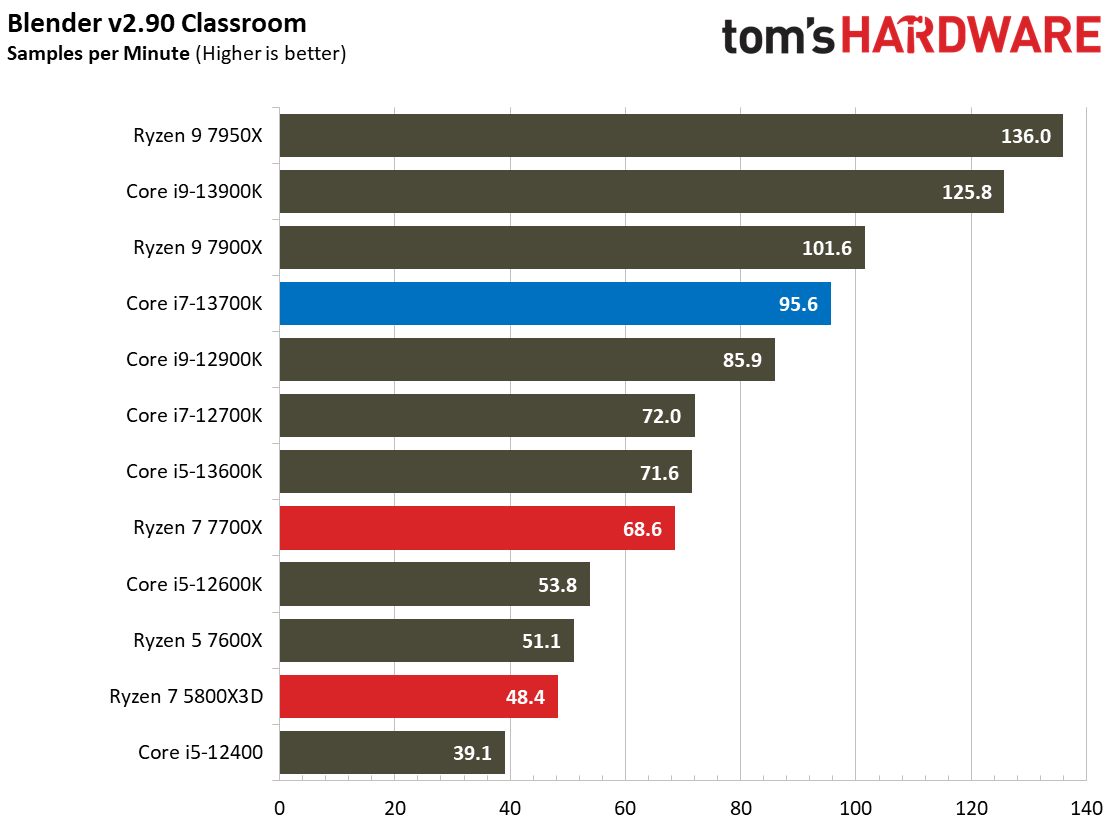
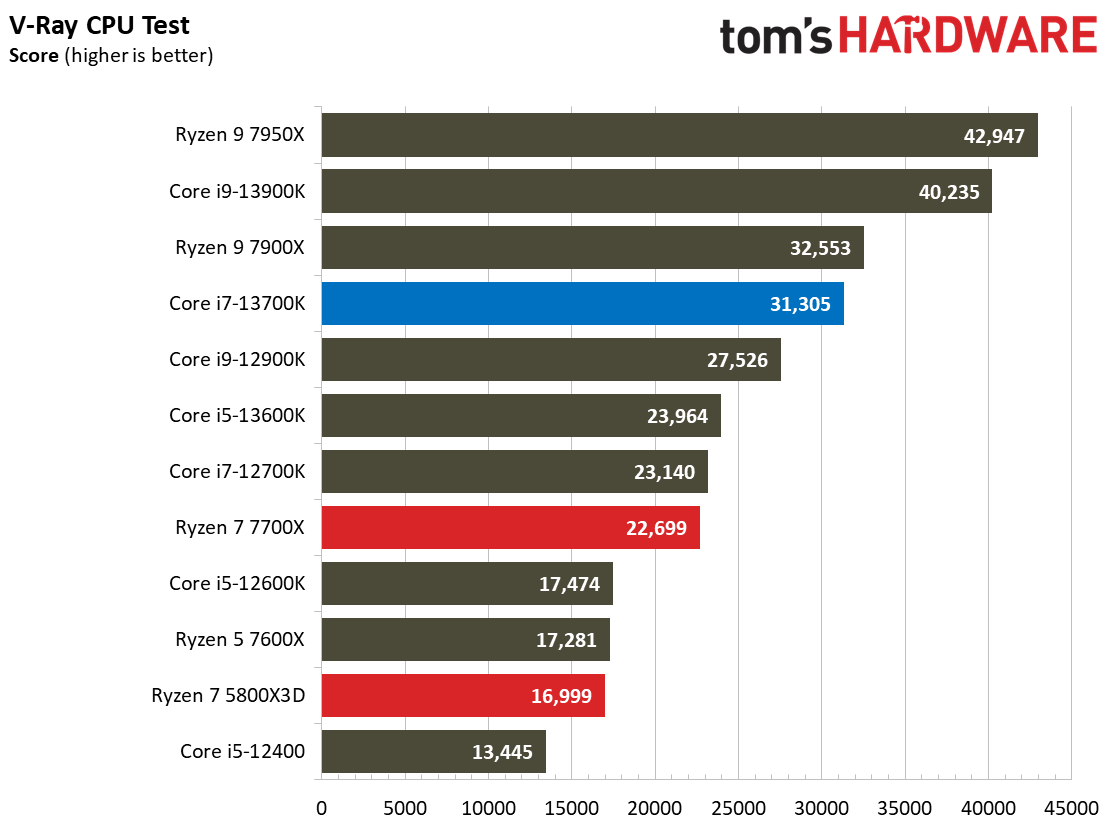
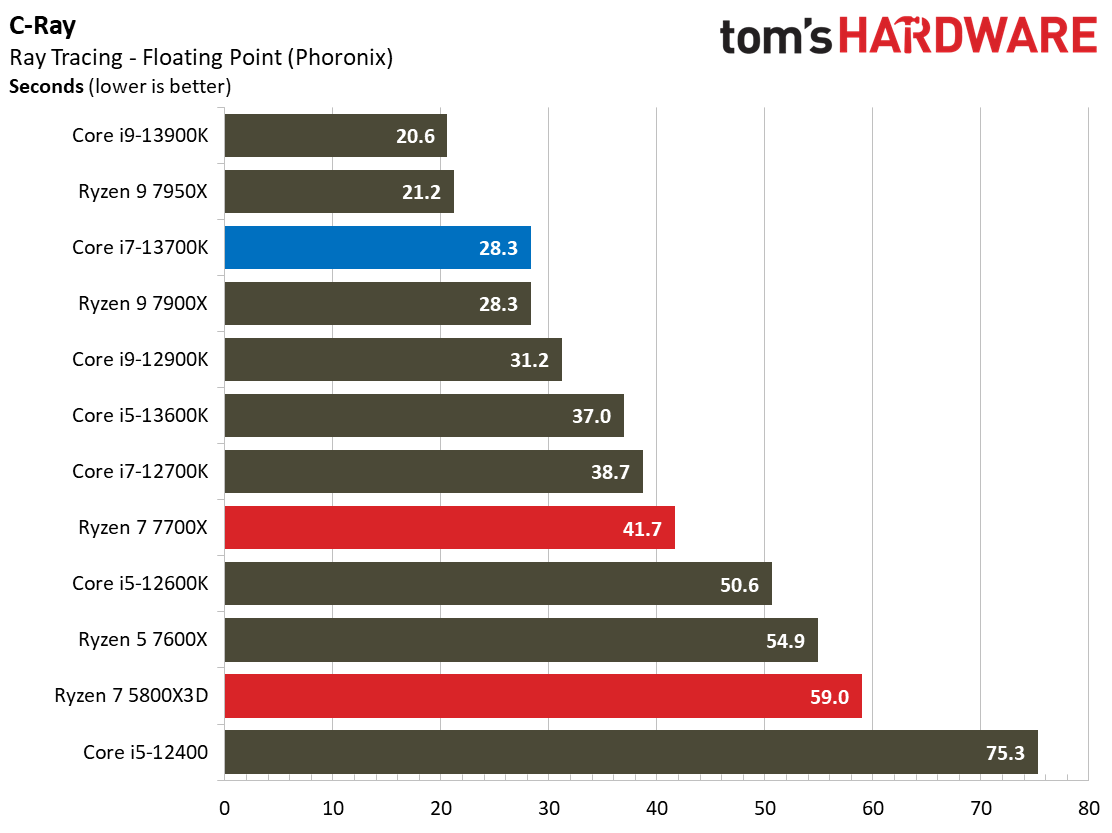
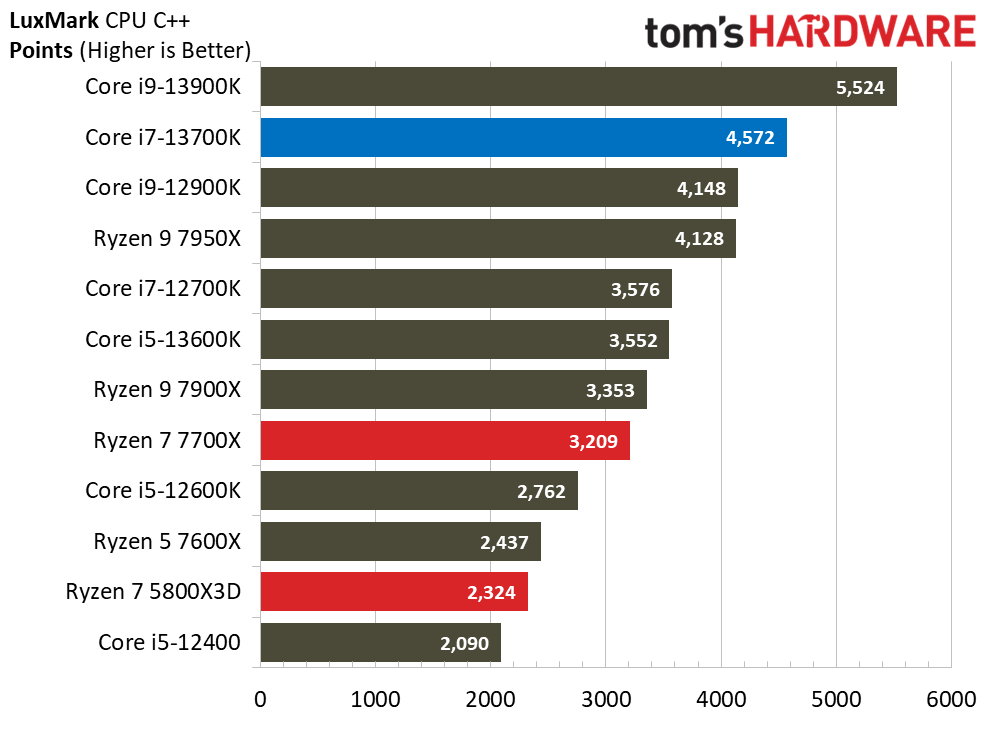
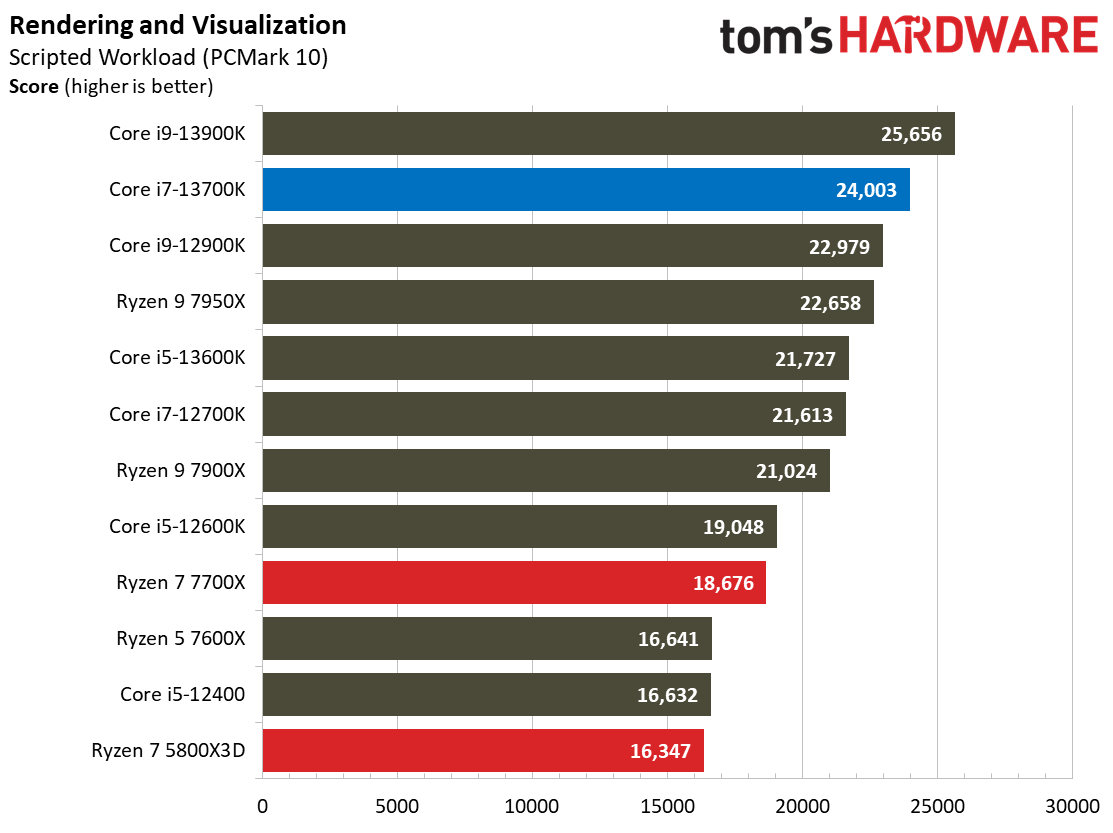
Intel's Raptor Lake delivers tremendous generational gains in multi-threaded productivity applications, rivaling or beating AMD's finest at every price point.
Overall, the 13700K dominates the multi-threaded rendering benchmarks. The $409 Core i7-13700K is 54% faster than the $399 Ryzen 7 7700X in the Cinebench benchmark, and more than twice as fast as the Ryzen 7 5800X3D. It even edges past the $549 Ryzen 9 7900X. We see an even bigger disparity in POV-Ray — the 13700K is 65% faster than the 7700X and 22% faster than the 7900X.
The 13700K also takes the lead in all of the single-threaded rendering benchmarks, showing that it's a great all-rounder.
Also, pay attention to the gen-on-gen improvements over Alder Lake — they're impressive.
Encoding Benchmarks on Intel Core i7-13700K
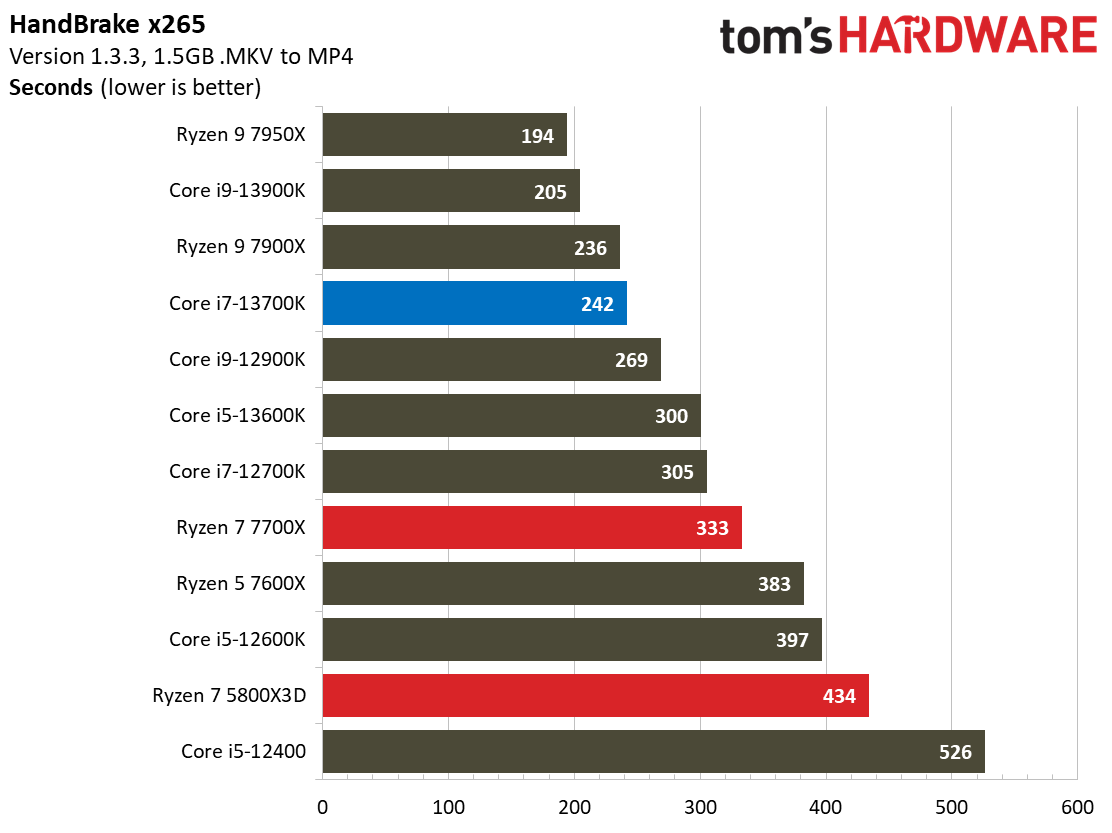
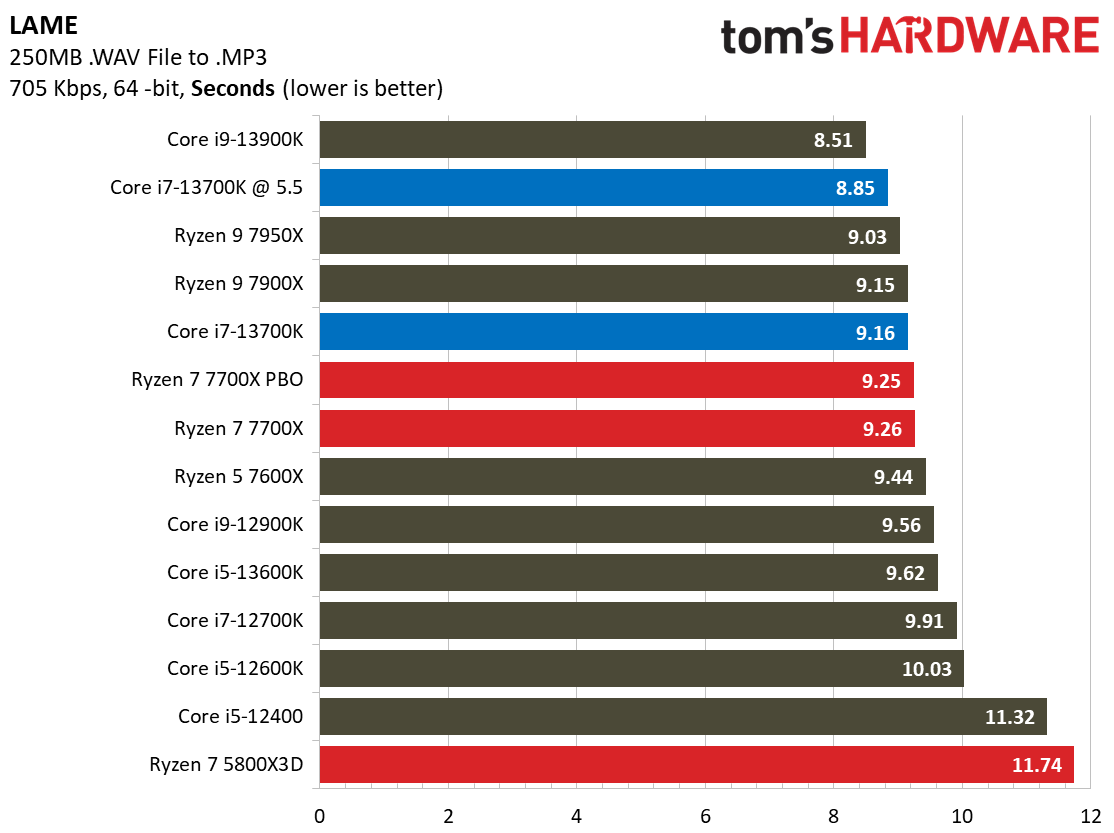
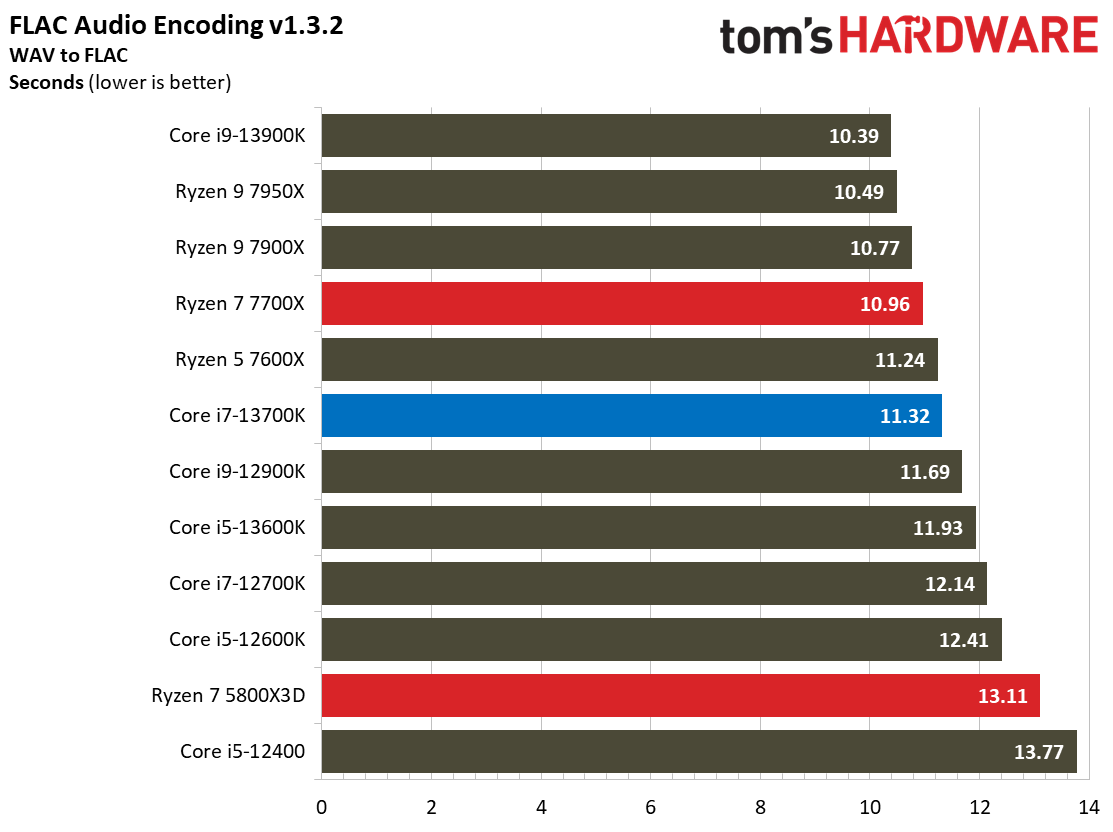
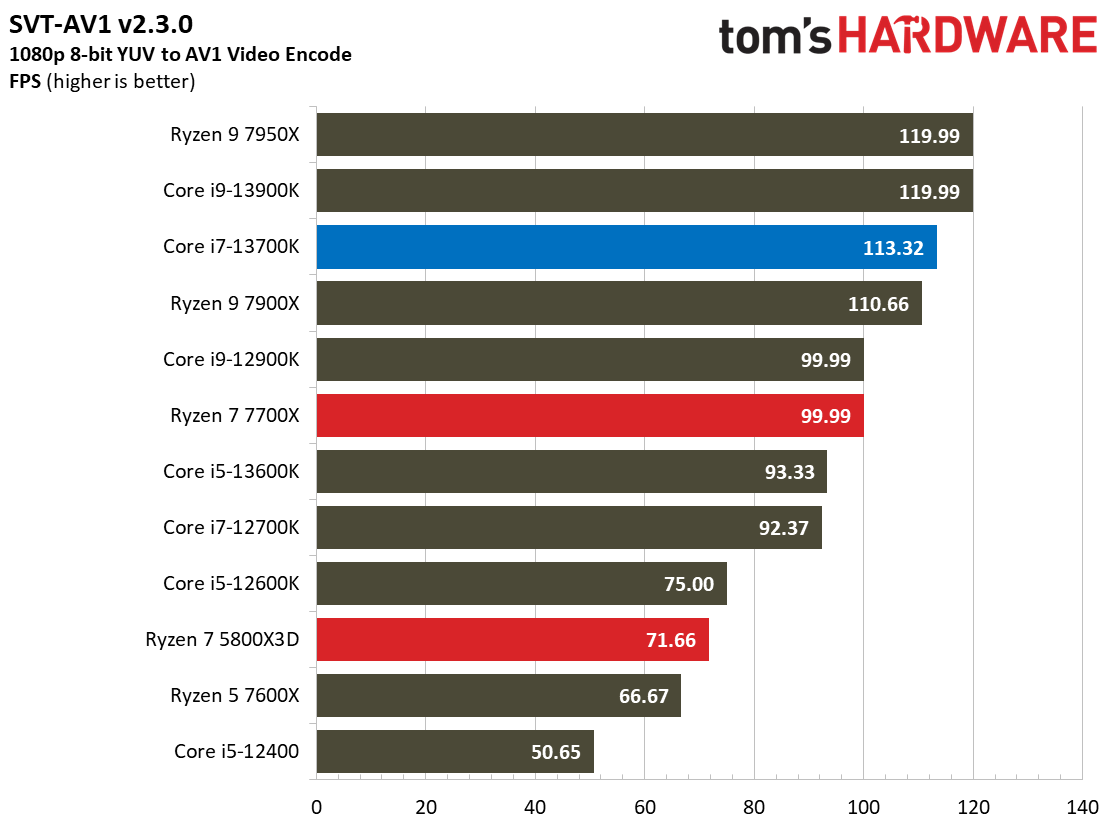
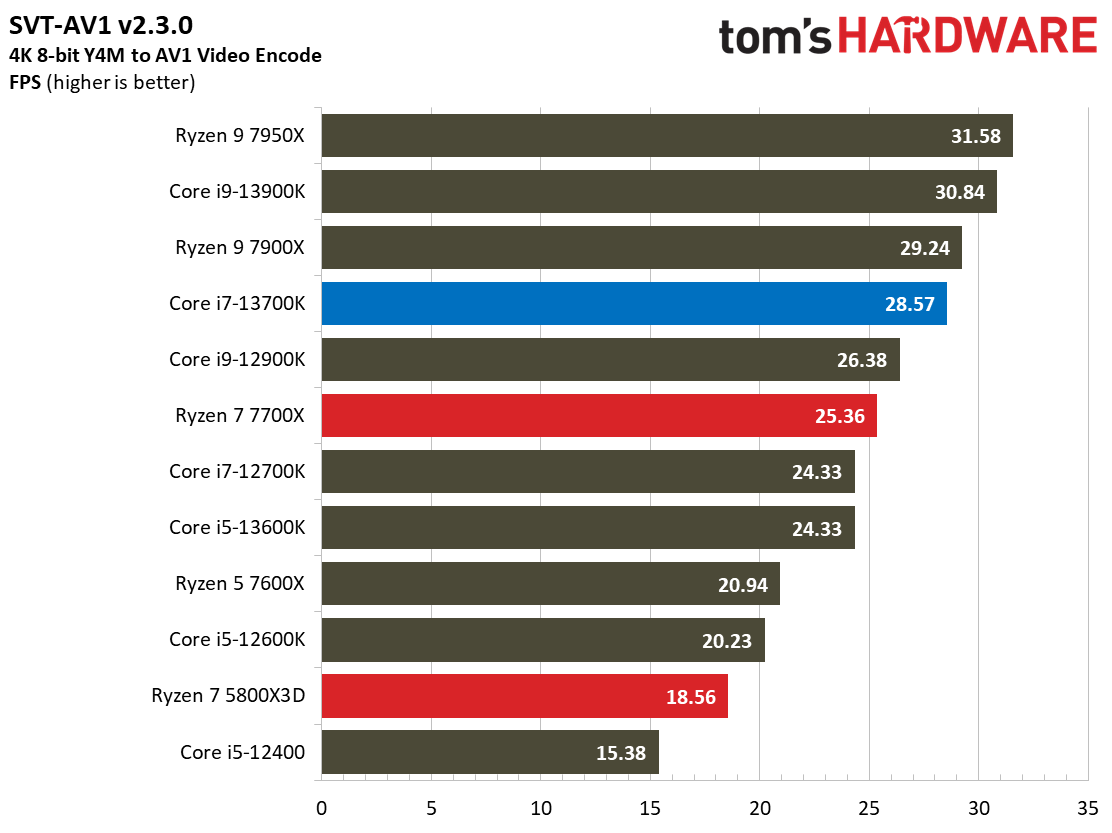
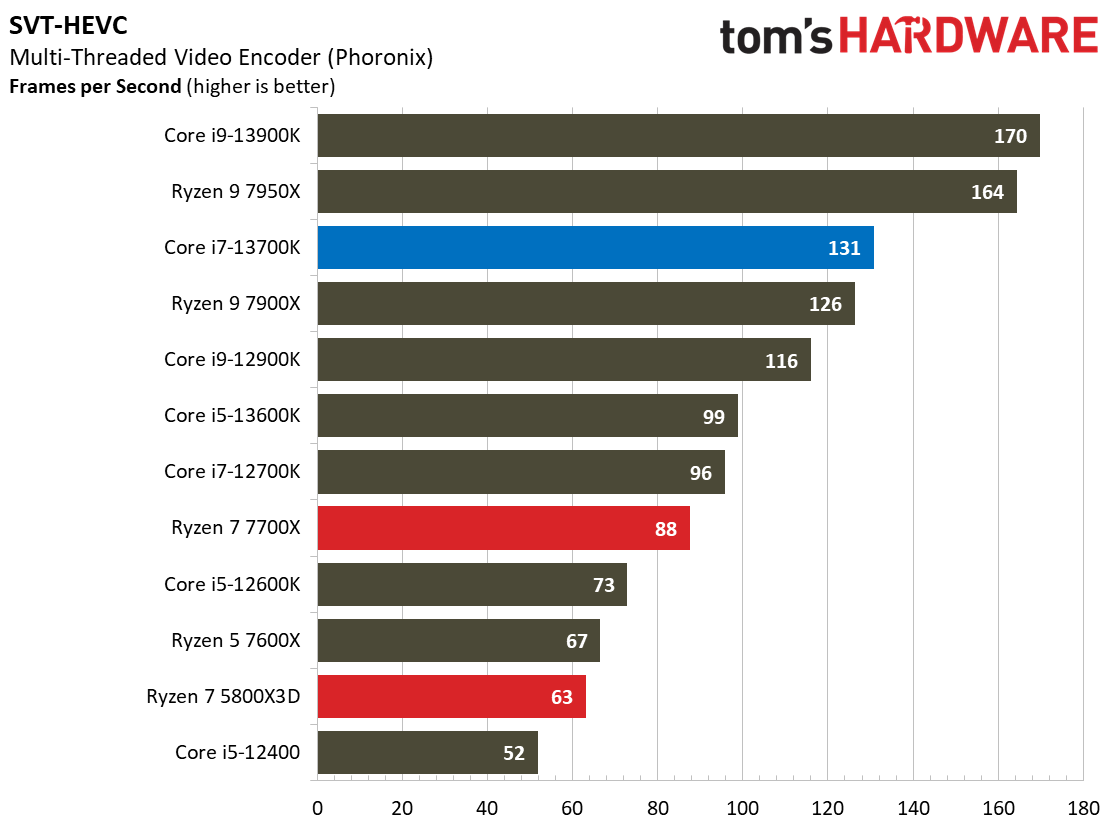
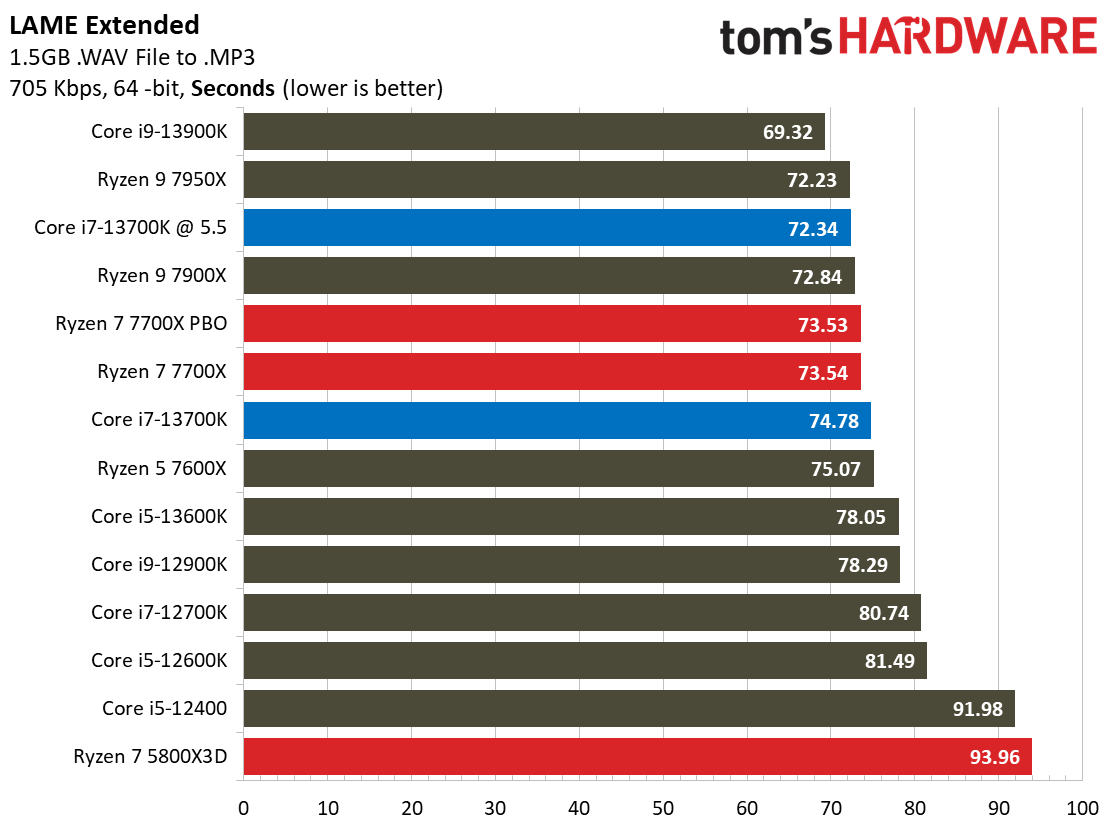
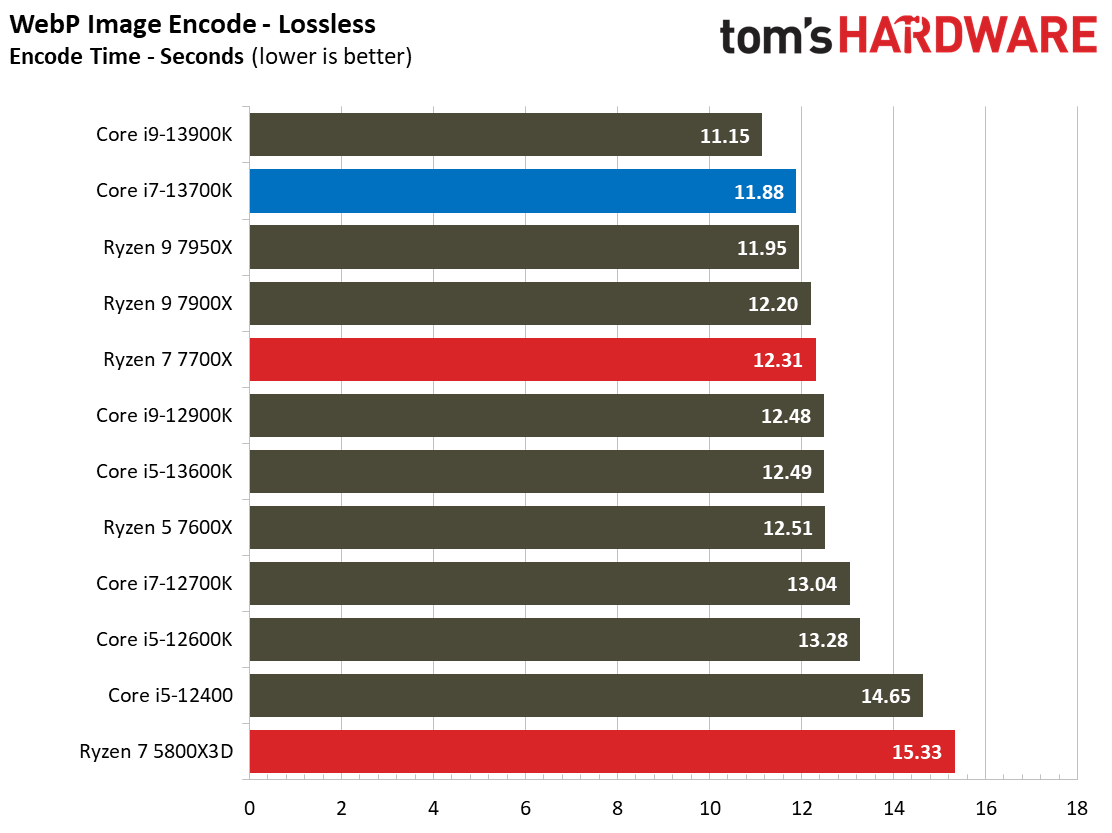
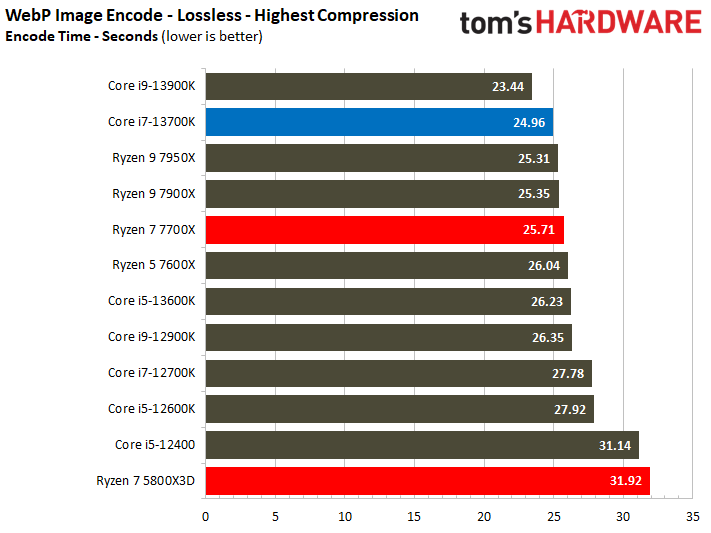
Most encoders tend to be either heavily threaded or almost exclusively single-threaded — it takes an agile chip to master both disciplines.
The Core i7-13700K meets that criteria against the Ryzen 7 7700X in both the single-threaded encoders, like LAME, WebP, and FLAC, and the threaded encoders, like SVT-HEVC, HandBrake, and AV1. Again, the Ryzen 7 5800X3D isn't remotely competitive in these types of application workloads, especially given its price.
Get Tom's Hardware's best news and in-depth reviews, straight to your inbox.
As an interesting aside, the speed of these modern chips has broken our AV1 1080p benchmark; the Core i9 and Ryzen 9 models are fast enough that they plateau at the top speed seen in the chart (especially the overclocked configurations that aren't shown). We'll update with a suitable replacement in the future, but we can see that the Core i7-13700K is significantly faster than the Ryzen 7 chips in this type of workload.
Adobe Premiere Pro, Photoshop and Lightroom on Intel Core i7-13700K
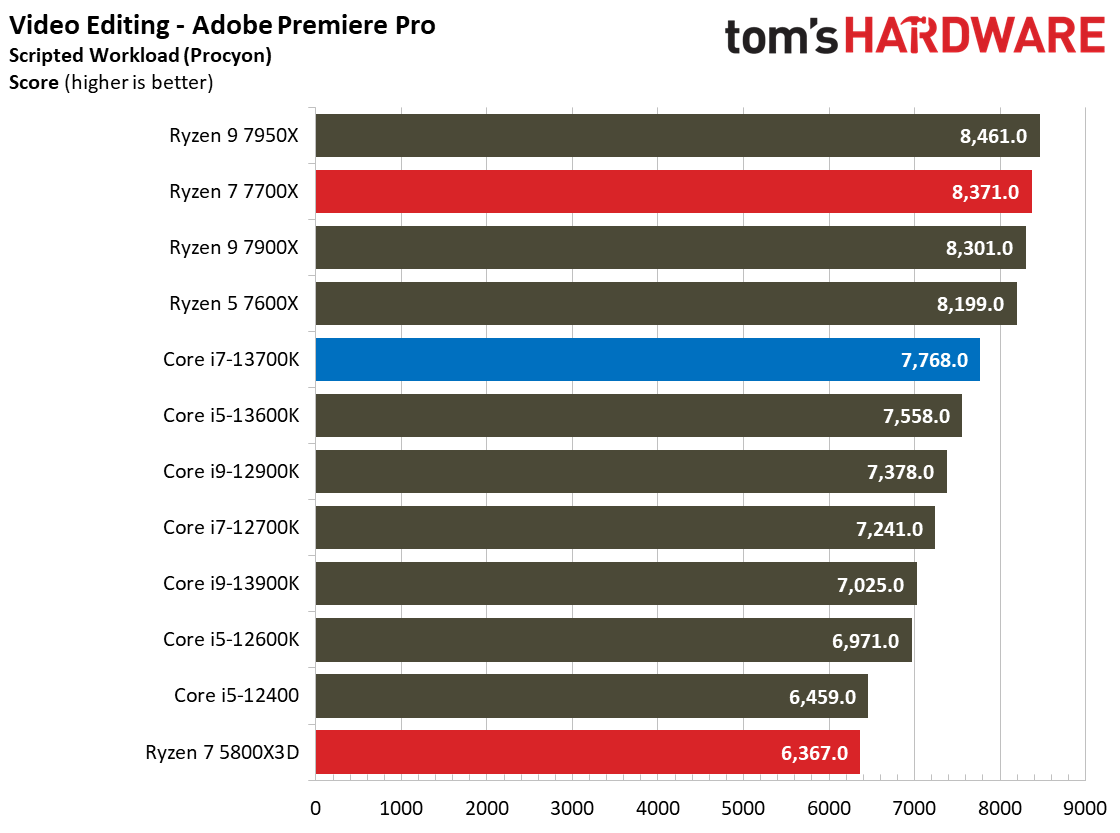
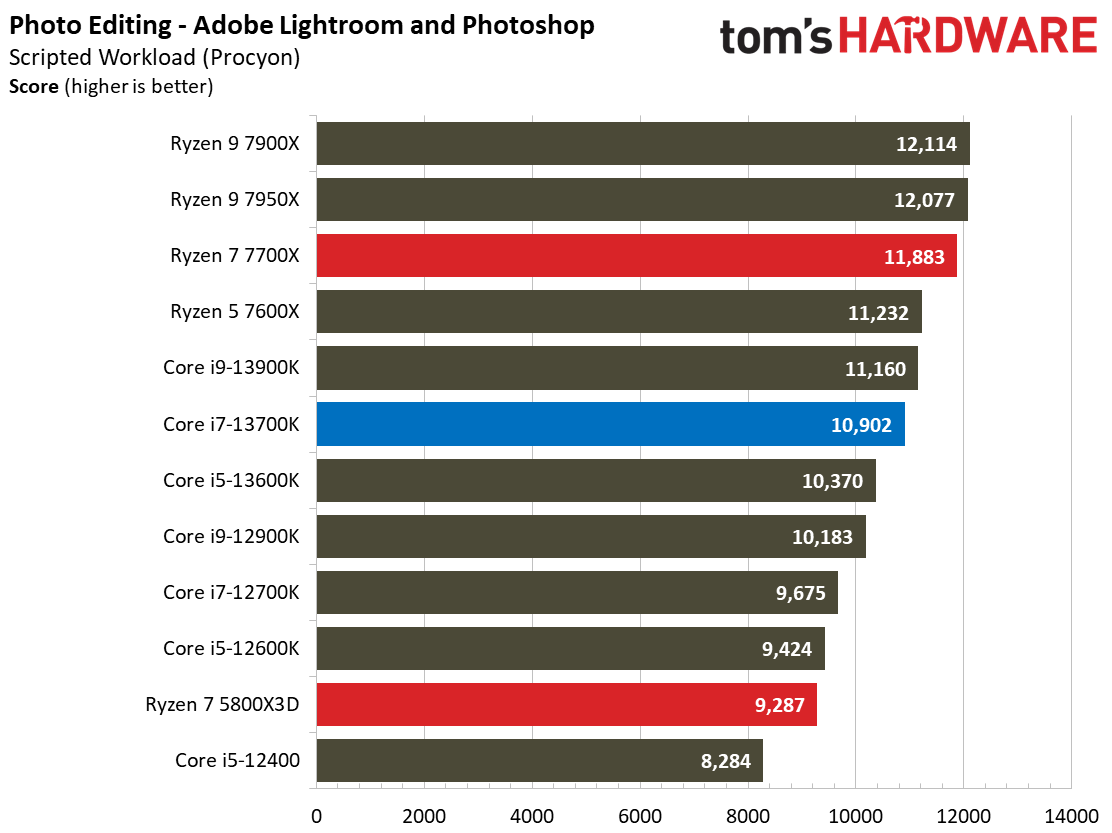
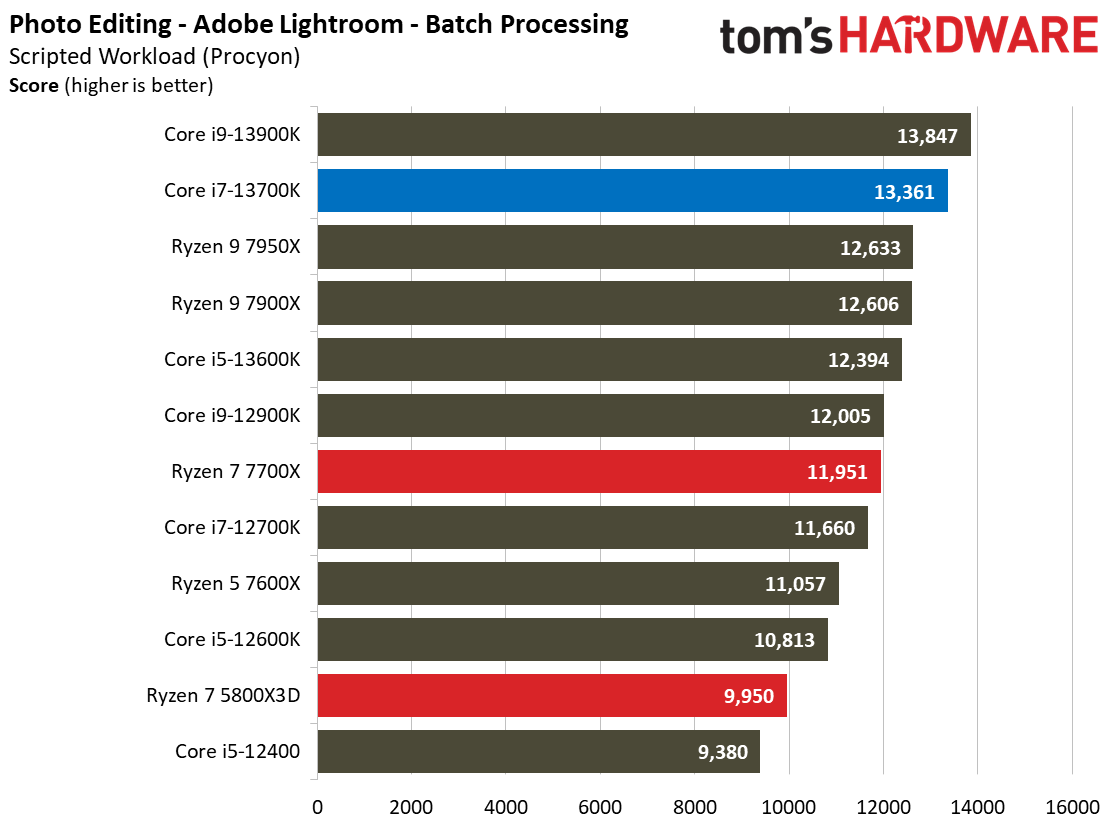
The UL Benchmarks Procyon benchmarks run complex Adobe Premiere Pro, Photoshop, and Lightroom workflows with the actual software, making for a great real-world test suite.
The Ryzen 7 7700X is 8% faster than the Core i7-13700K in the Adobe Premiere Pro video editing benchmark, and 9% faster in the Adobe Lightroom and Photoshop benchmarks, much-needed wins for the Zen 4 chip.
Web Browsing, Office and Productivity on Intel Core i7-13700K
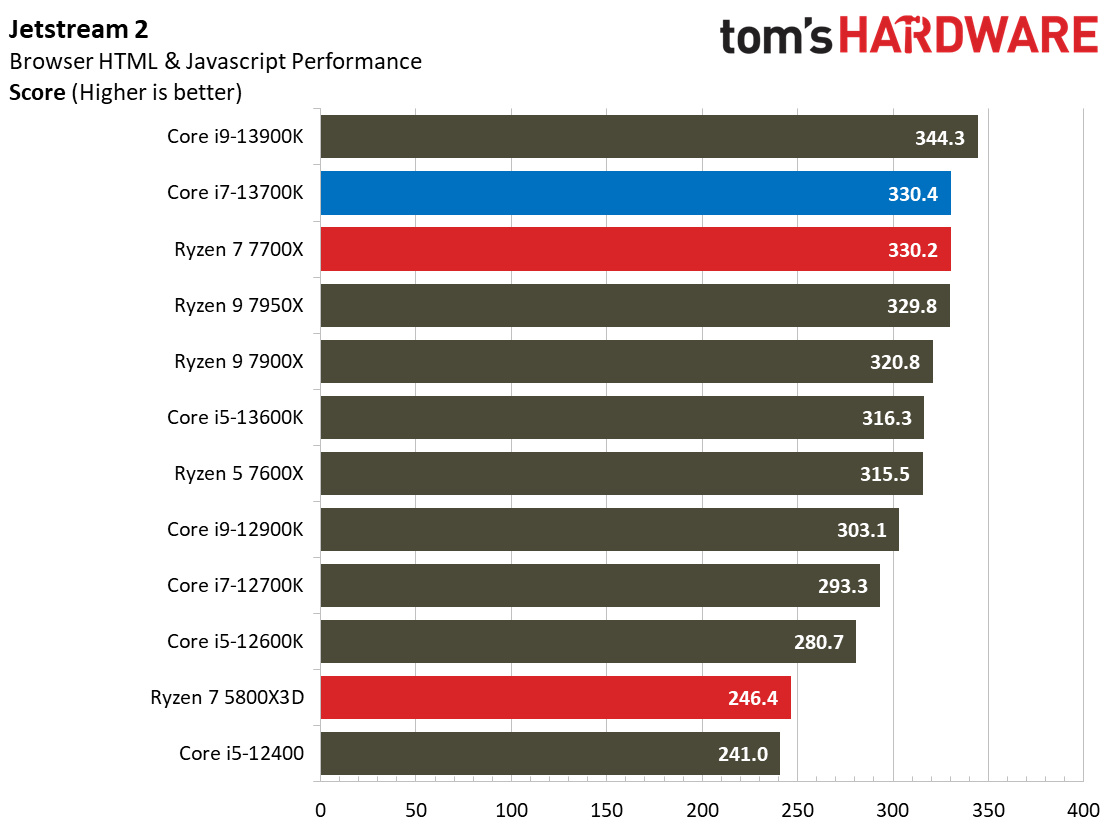
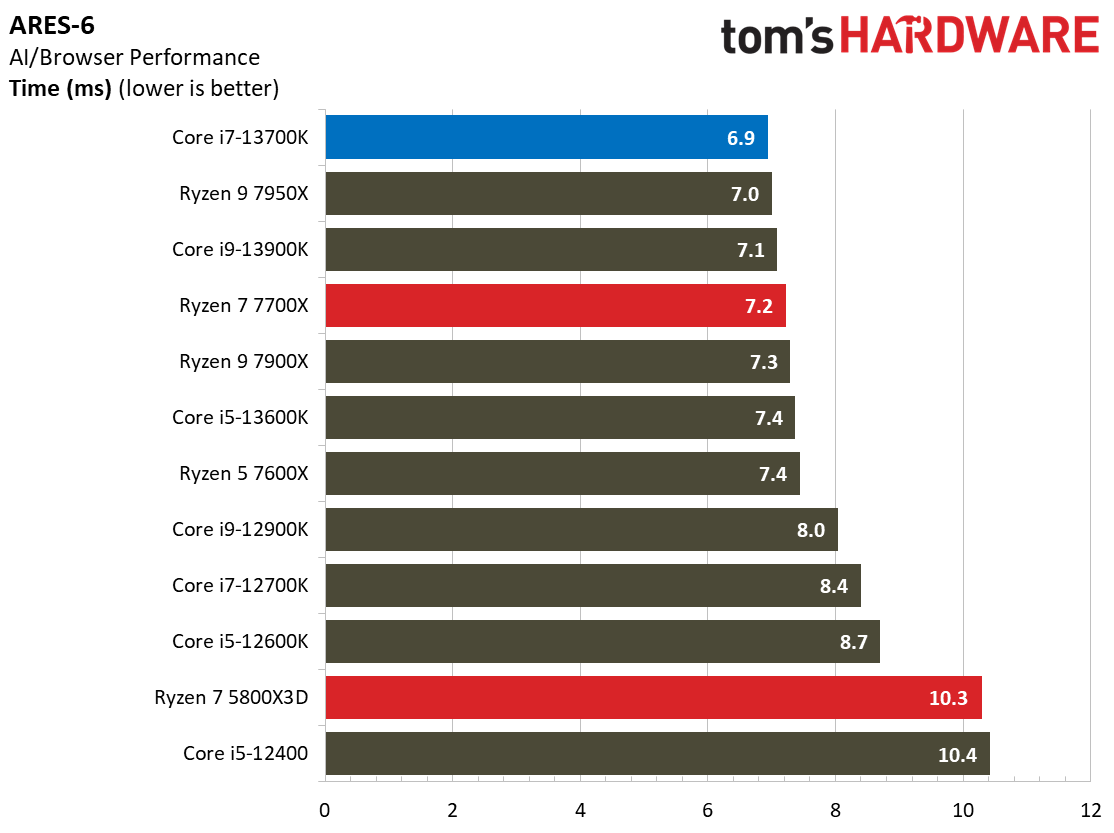
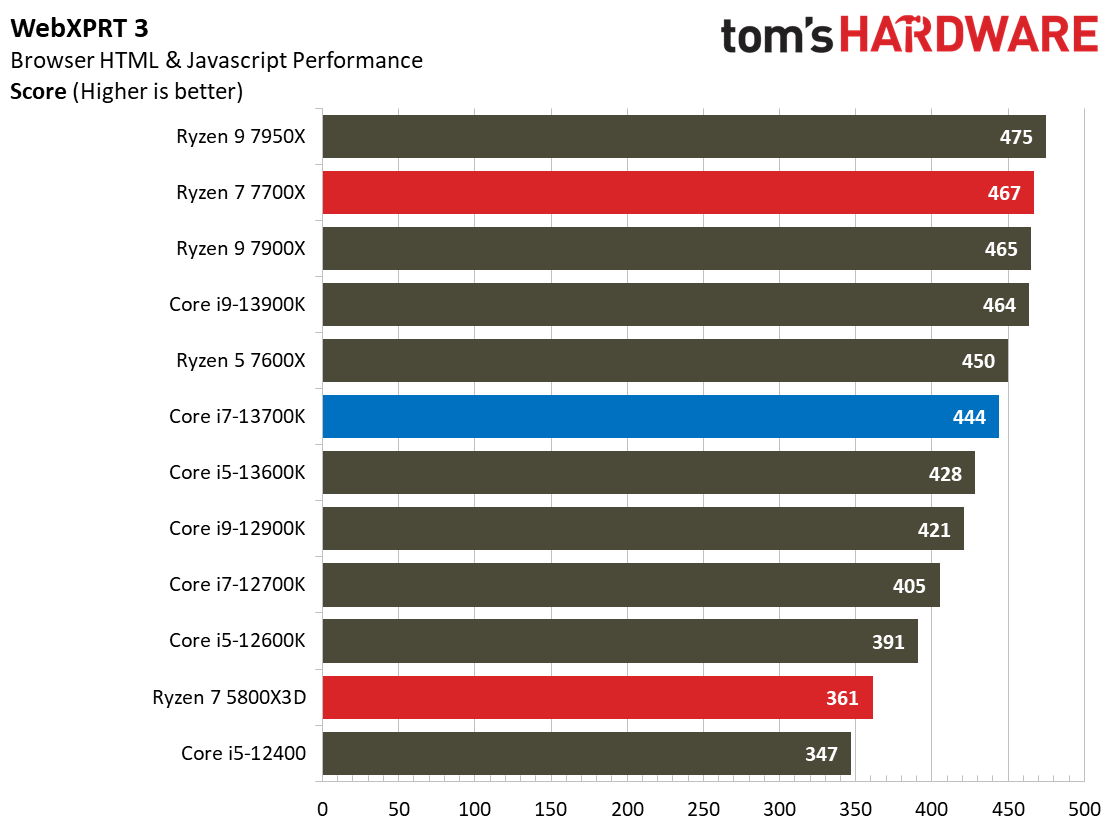
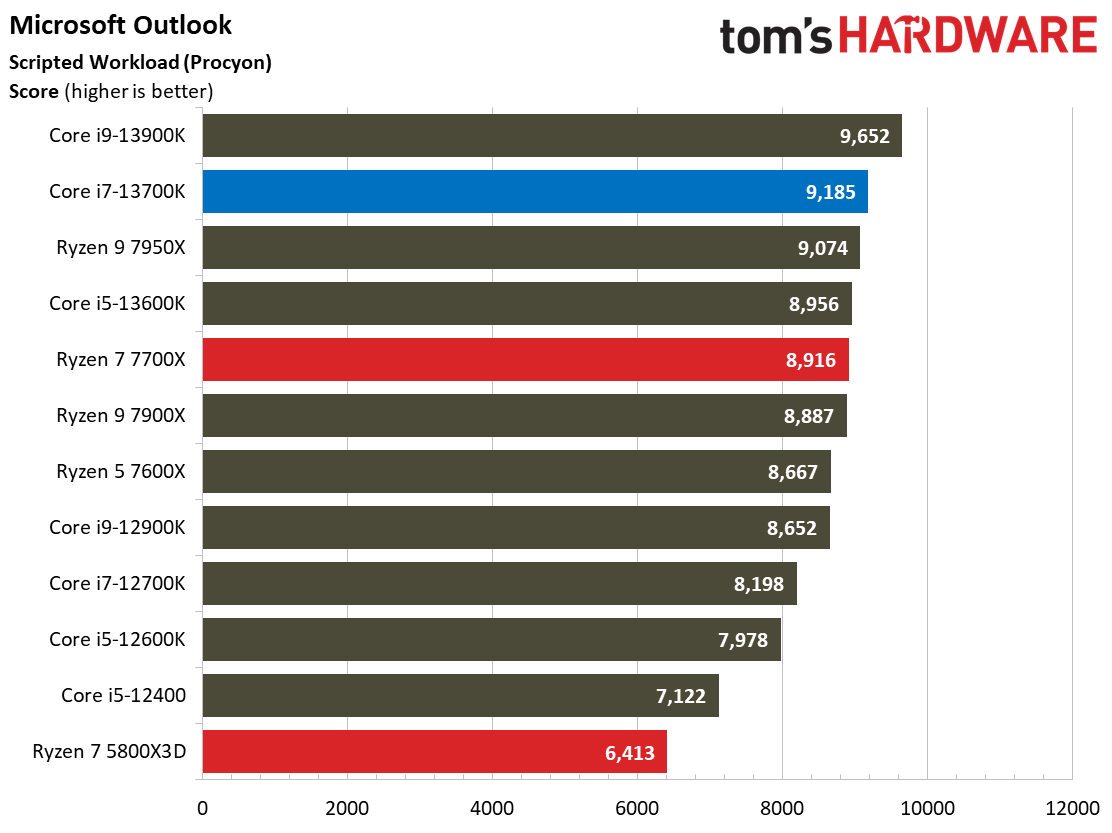
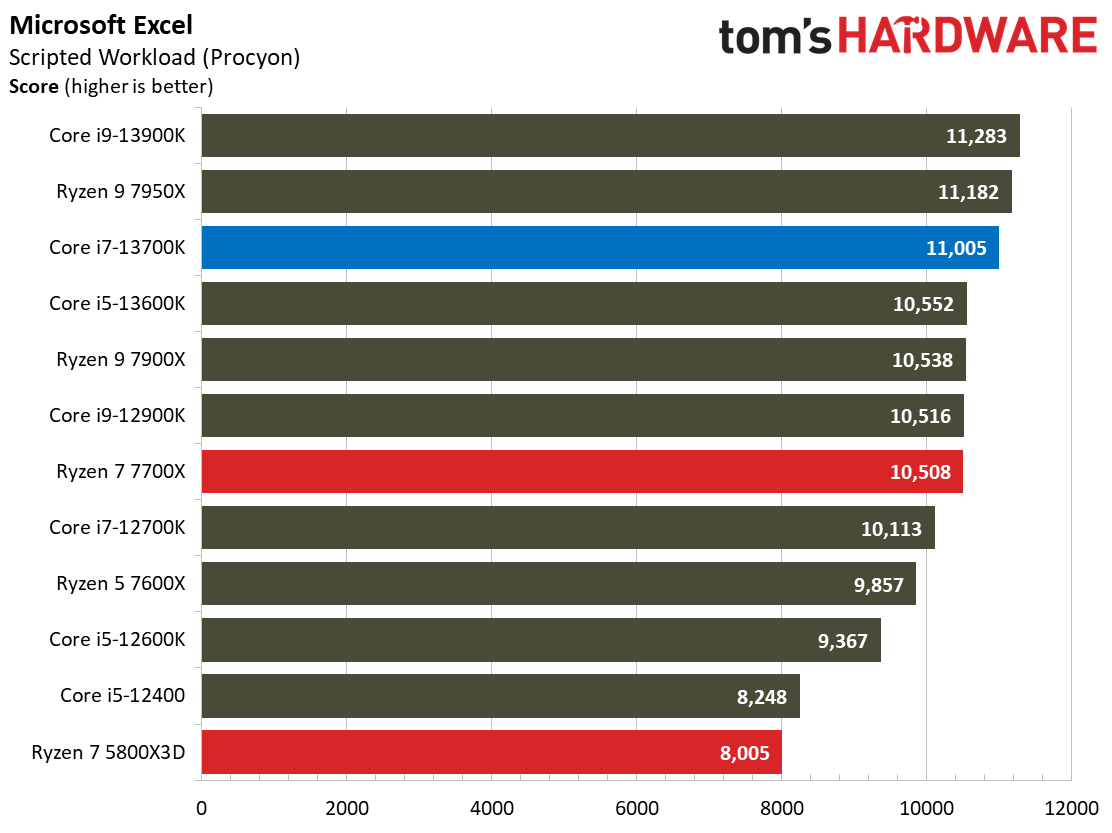
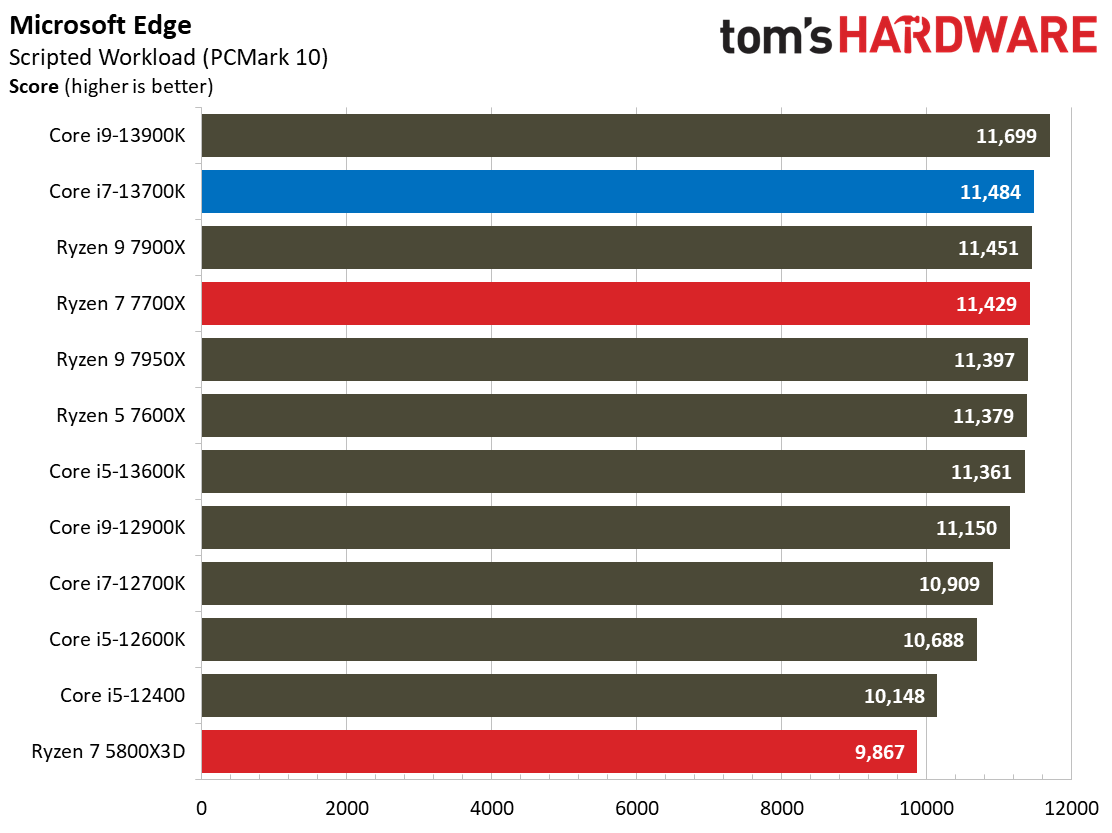
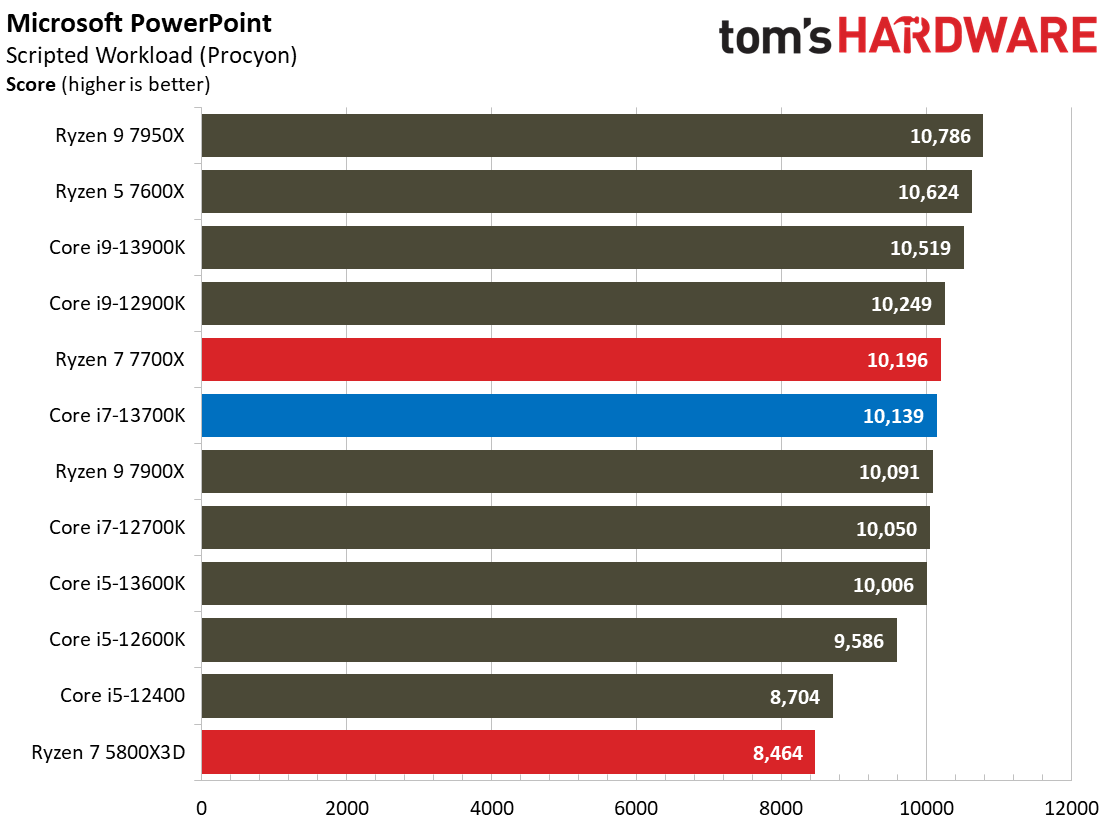
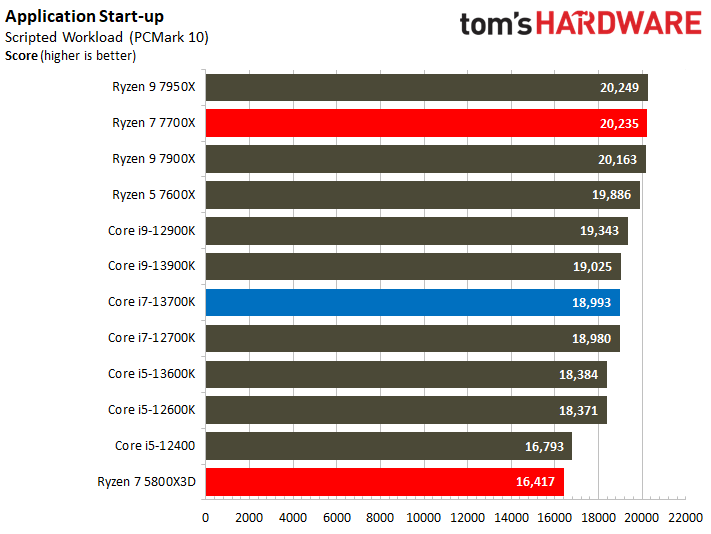
The ubiquitous web browser is one of the most frequently used applications. These latency-sensitive tests tend to be lightly threaded, so a fast response time is critical.
Ryzen 7000 goes a long way to improving AMD’s performance here, and the Ryzen 7 7700X is no exception — here we can see that it essentially ties the 13700K in the Ares-6, Jetstream 2, and Edge browser benchmarks, and is 5% faster than the 13700K in WebXPRT 3.
Compilation, Compression, AVX-512 Performance on Intel Core i7-13700K
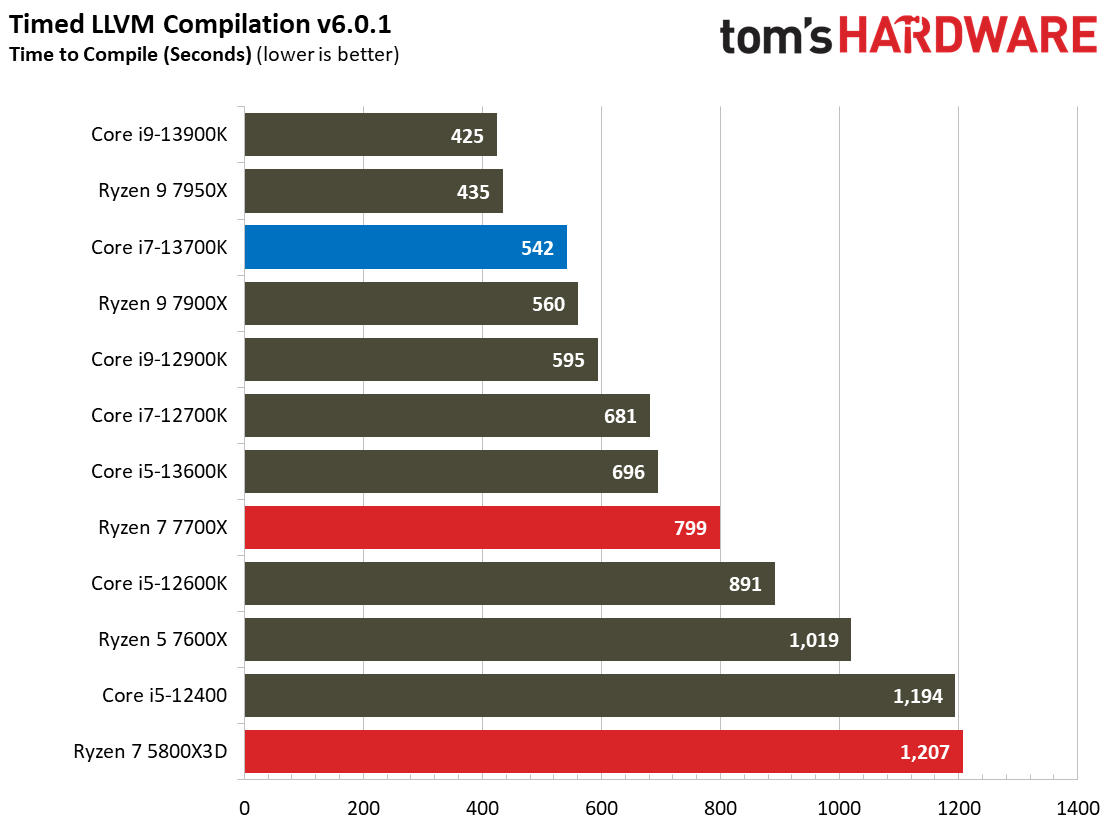
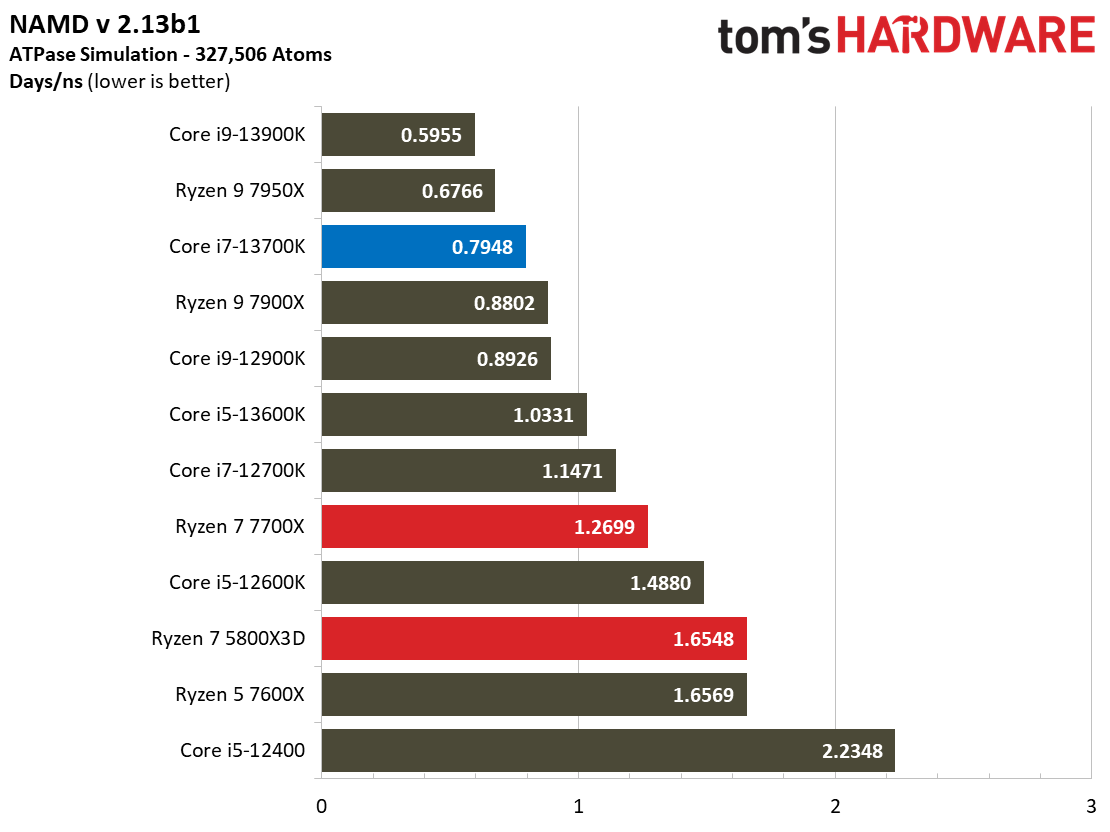
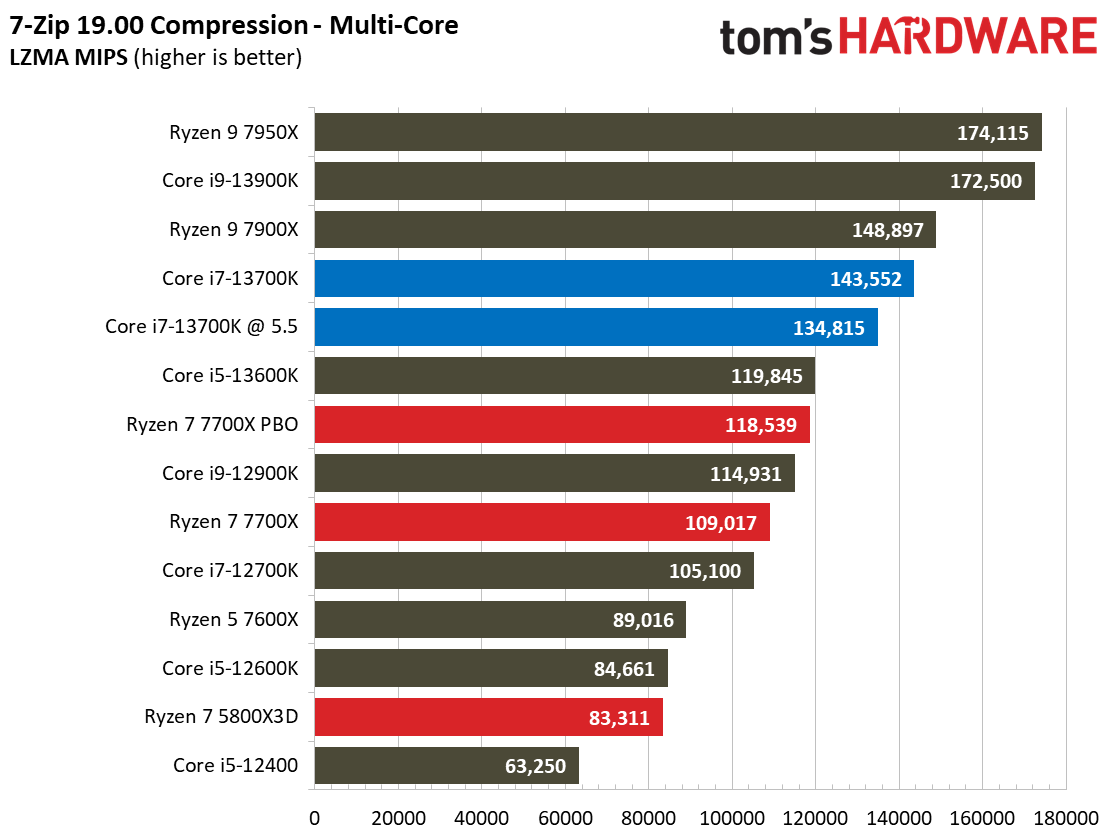
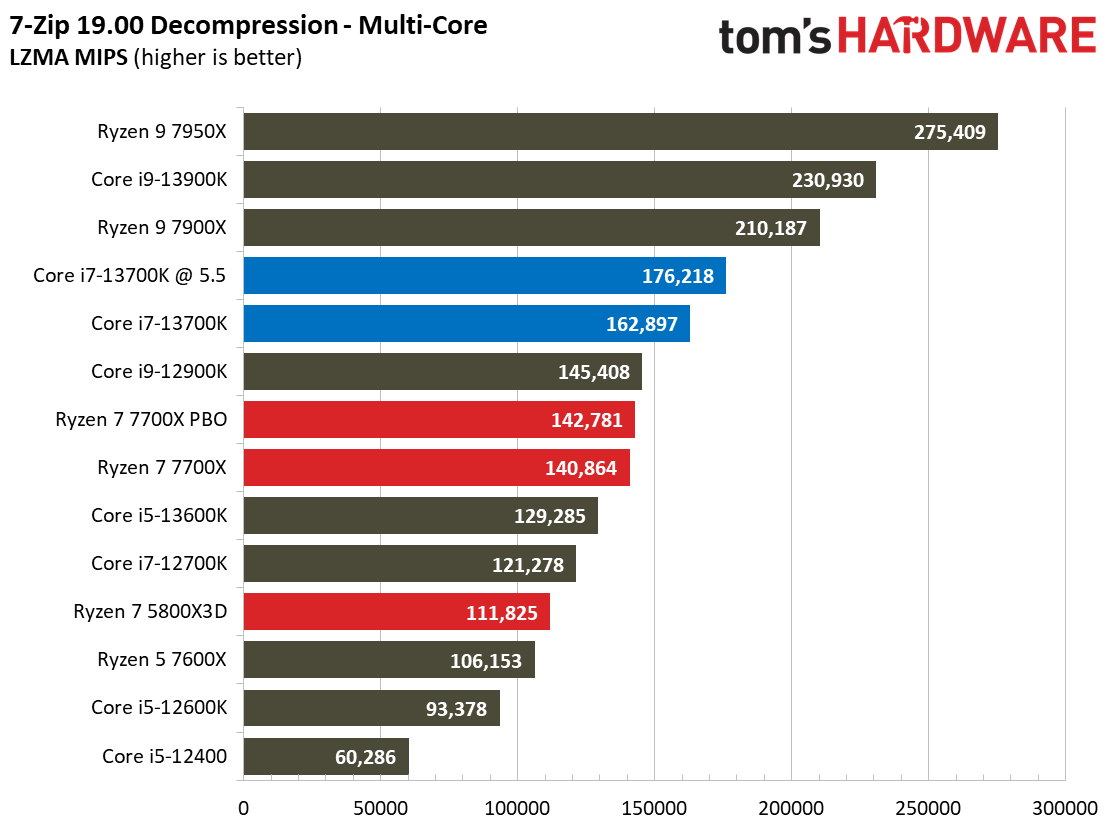
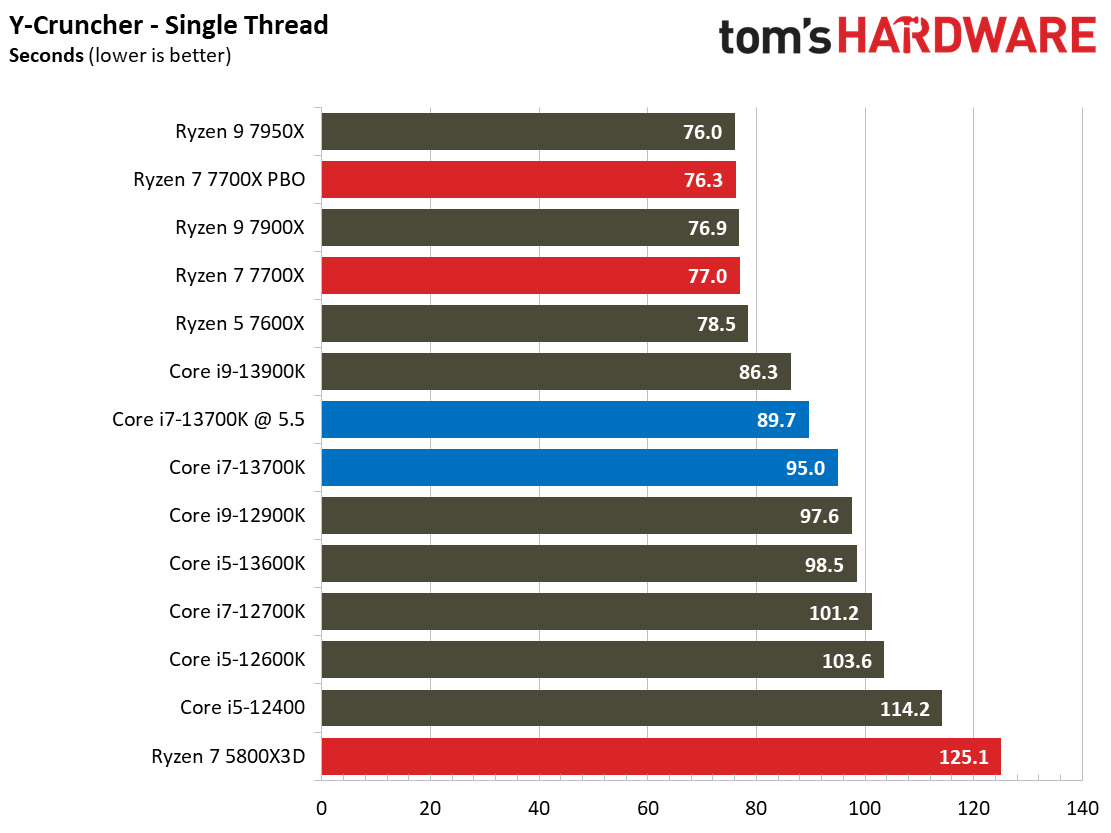
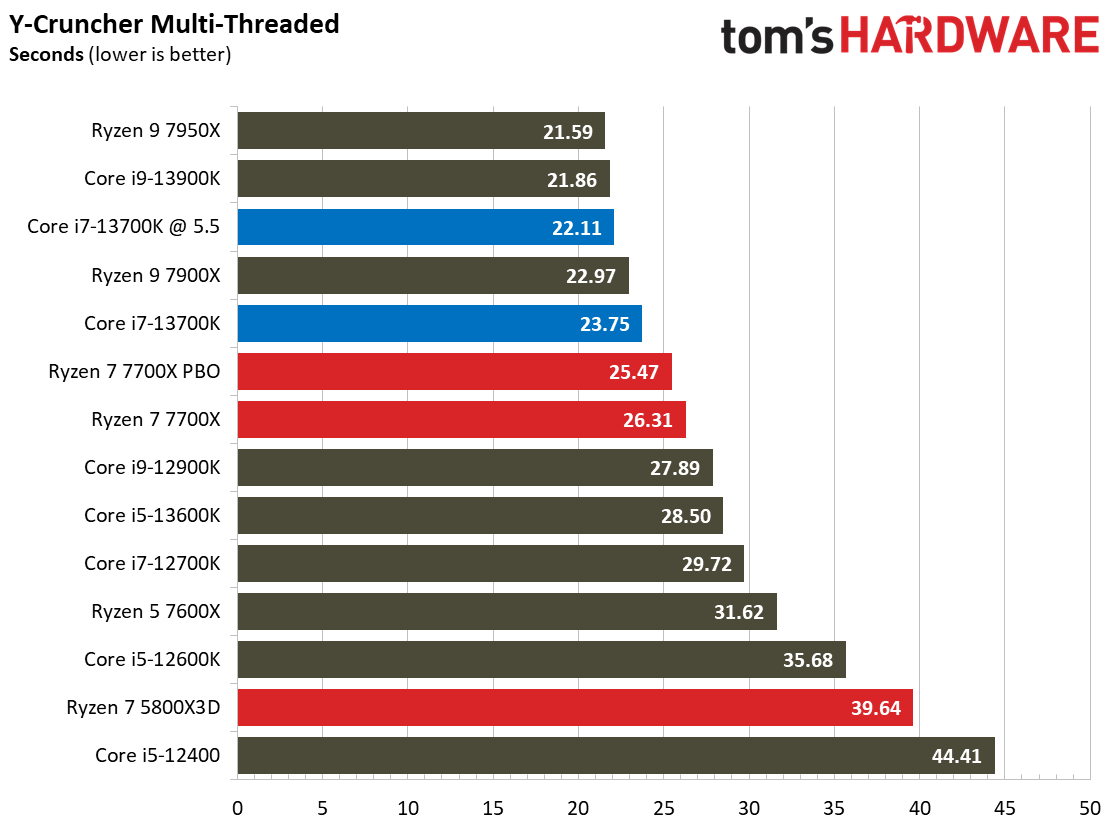
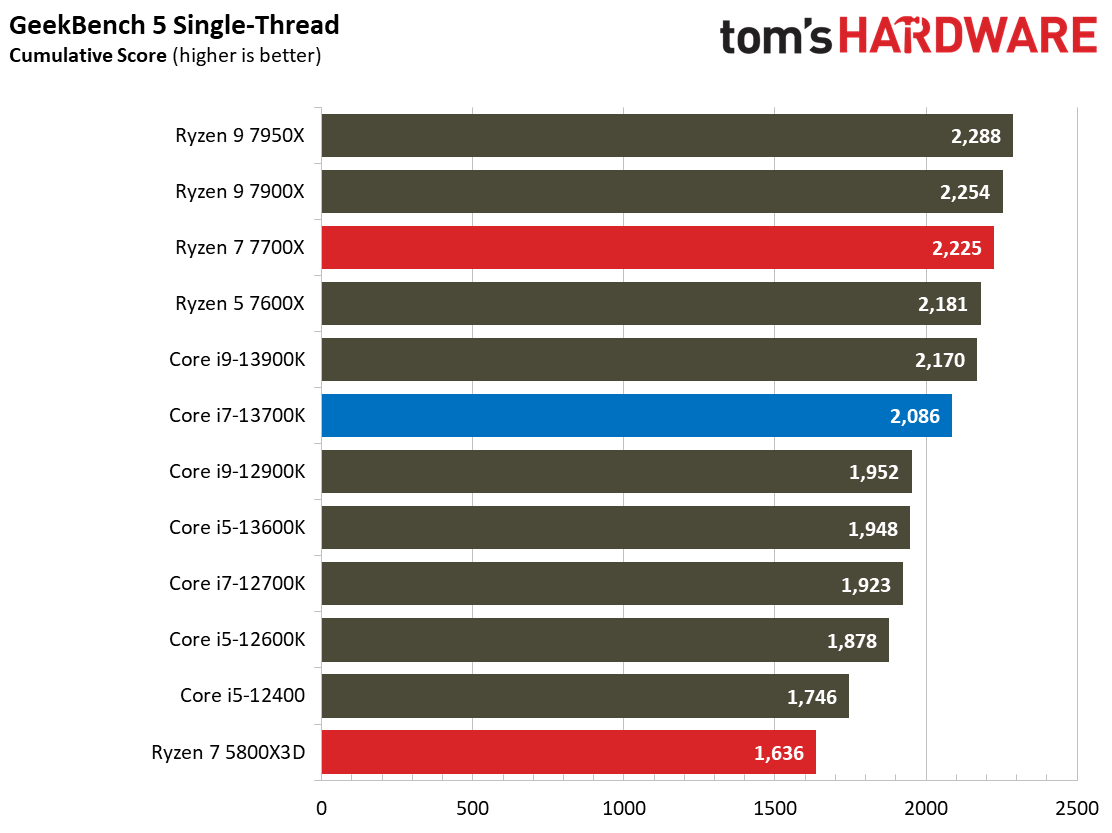
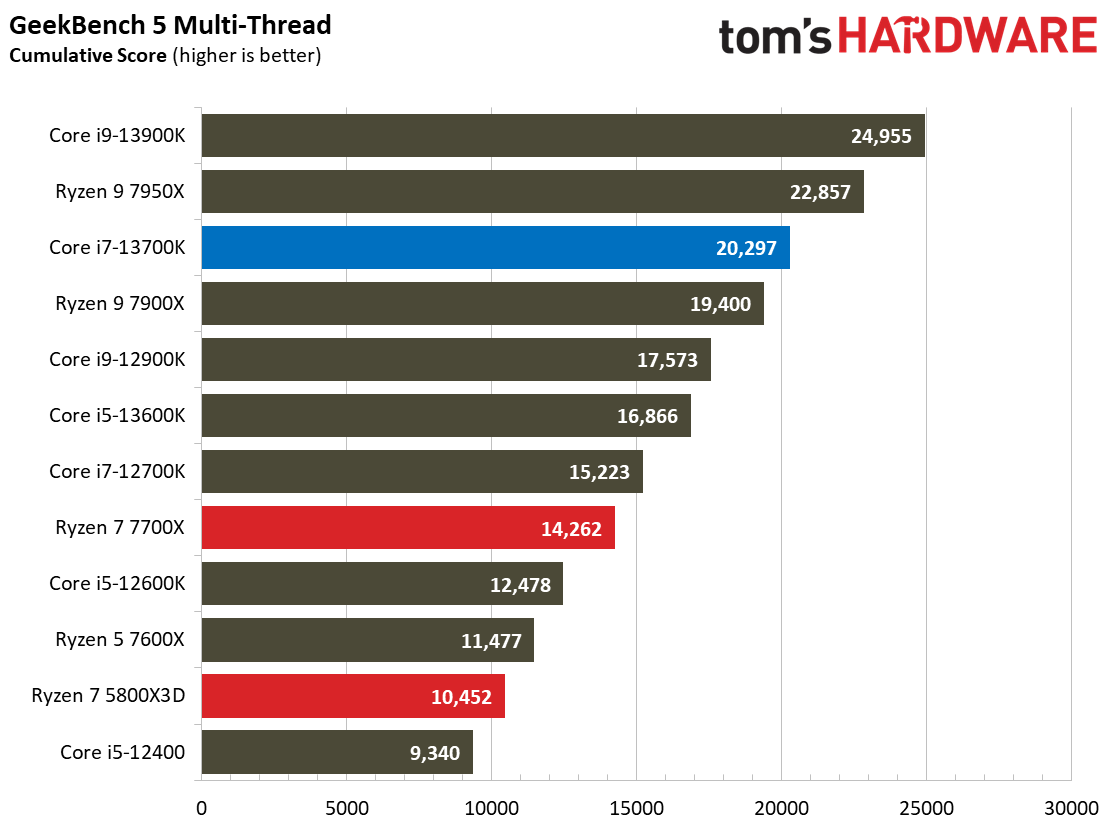
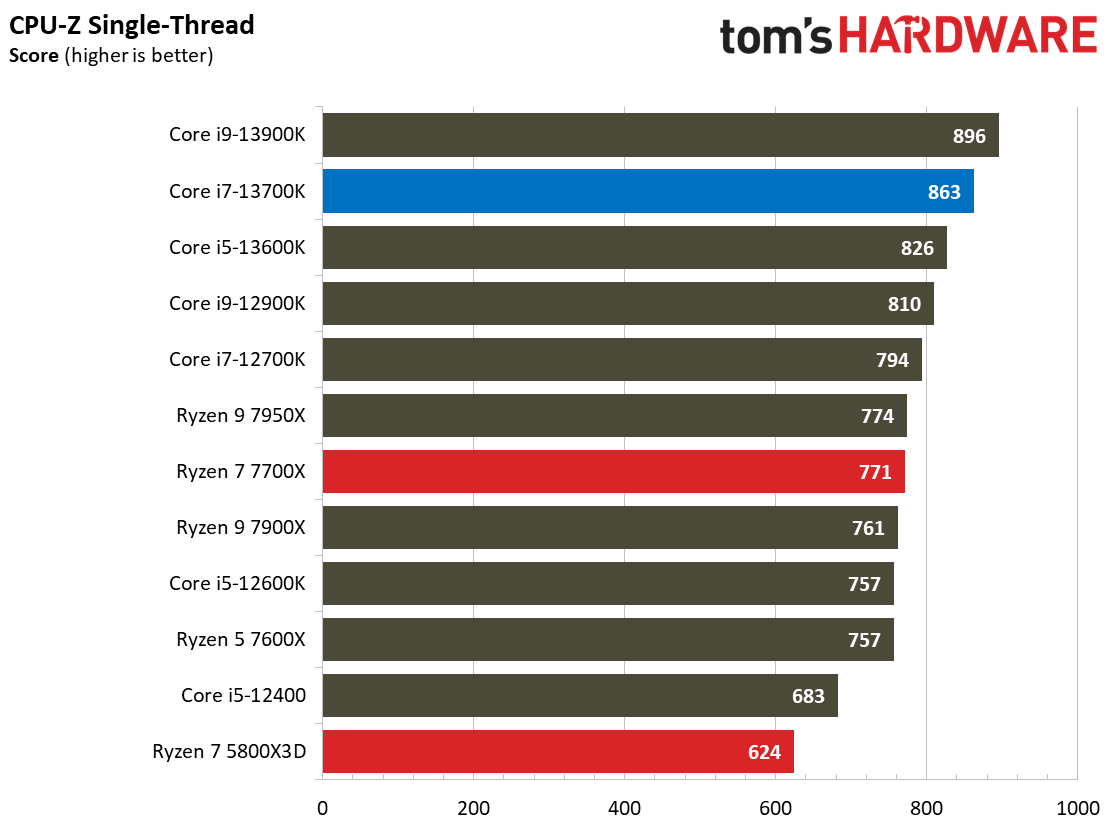
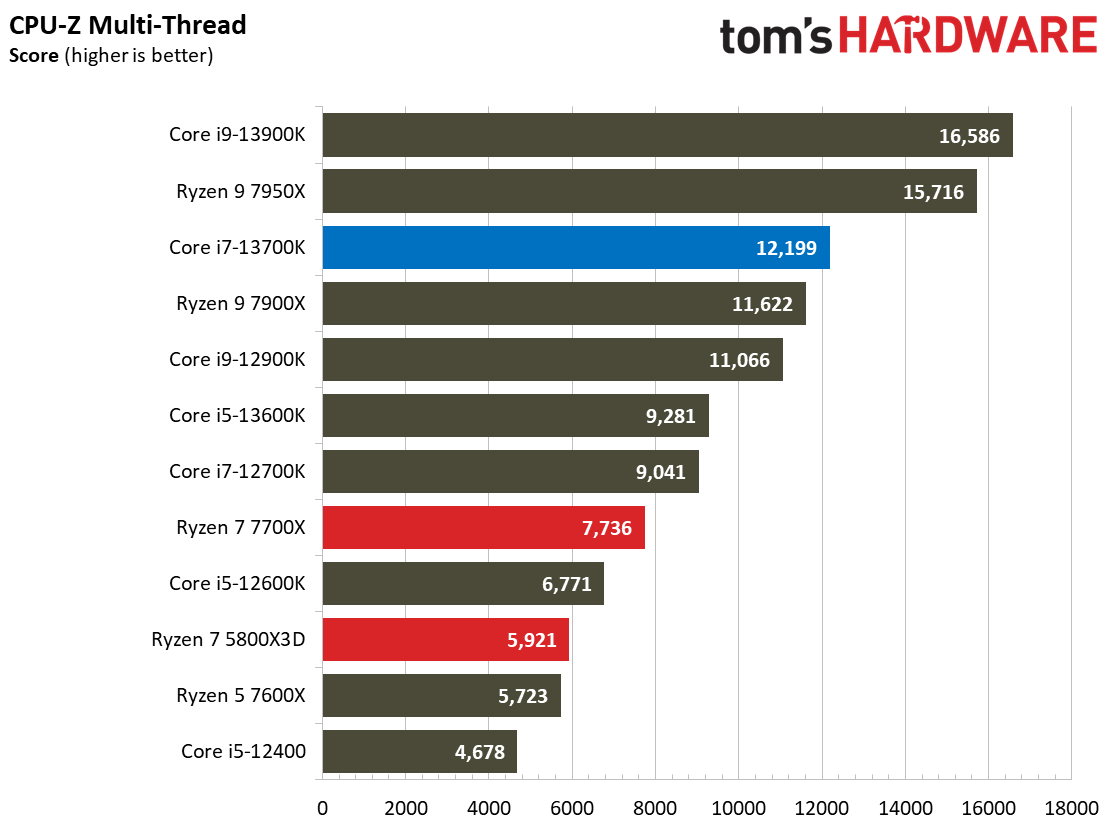
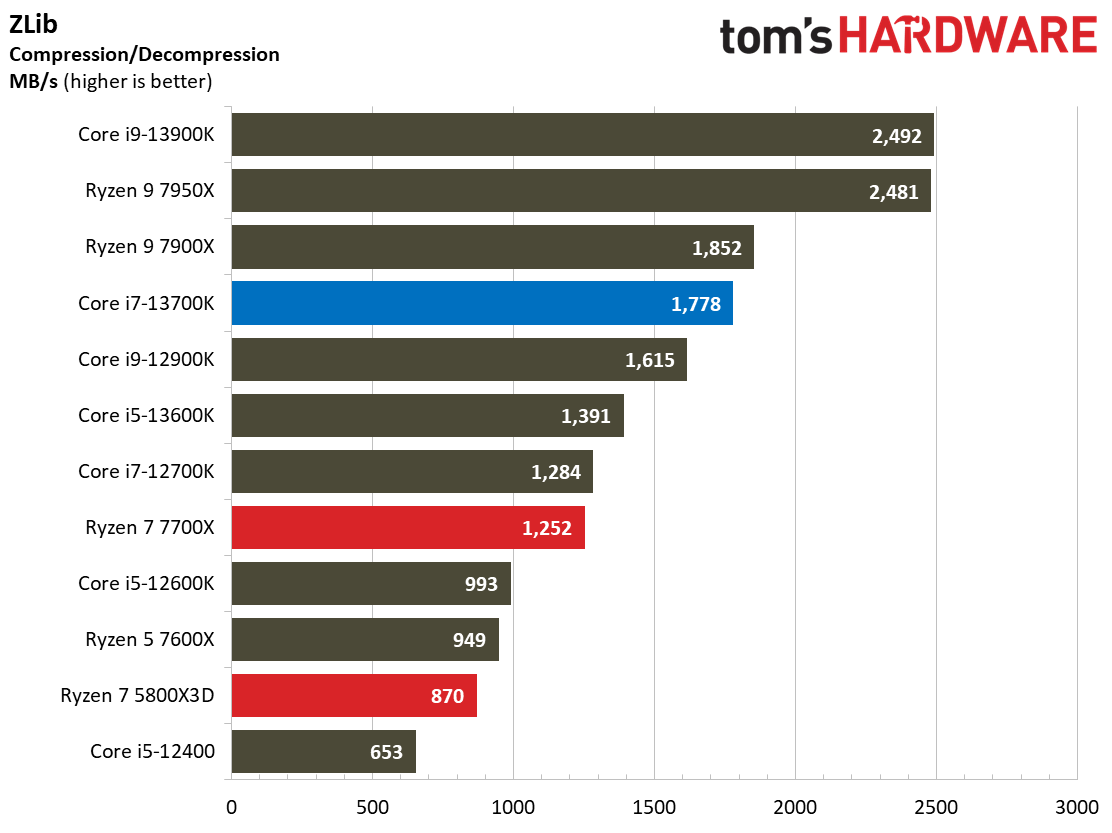
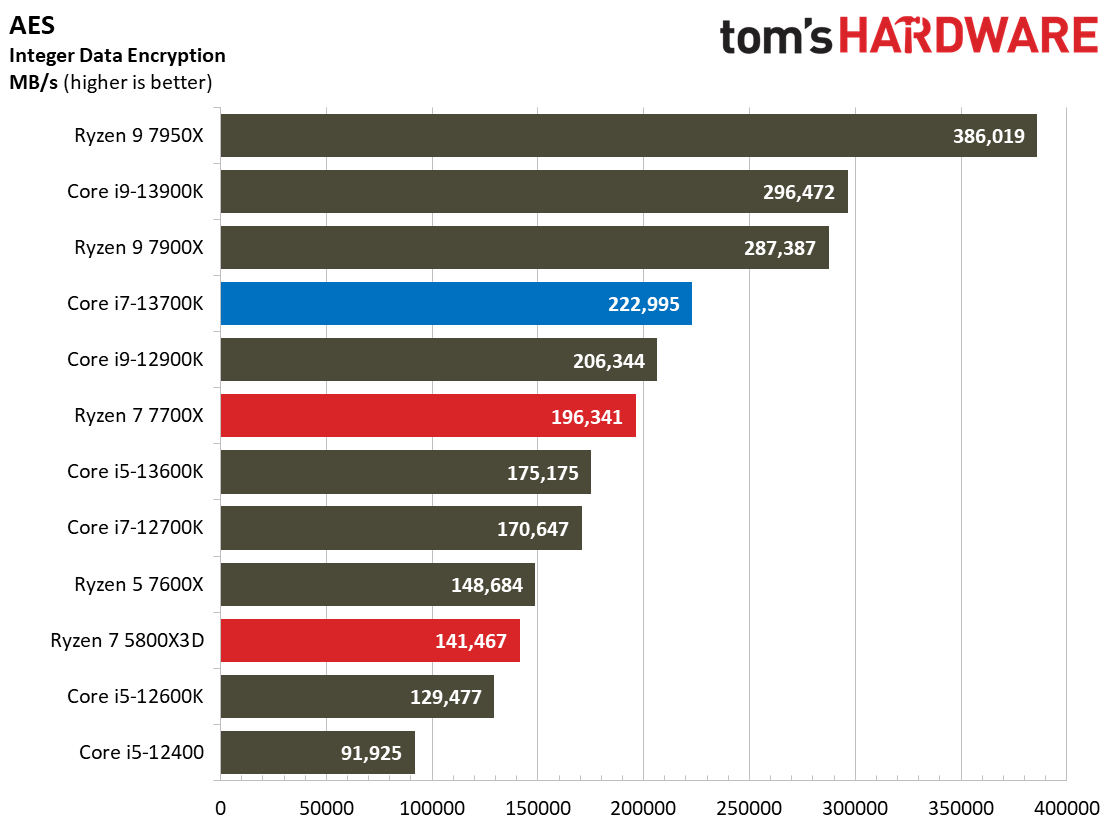
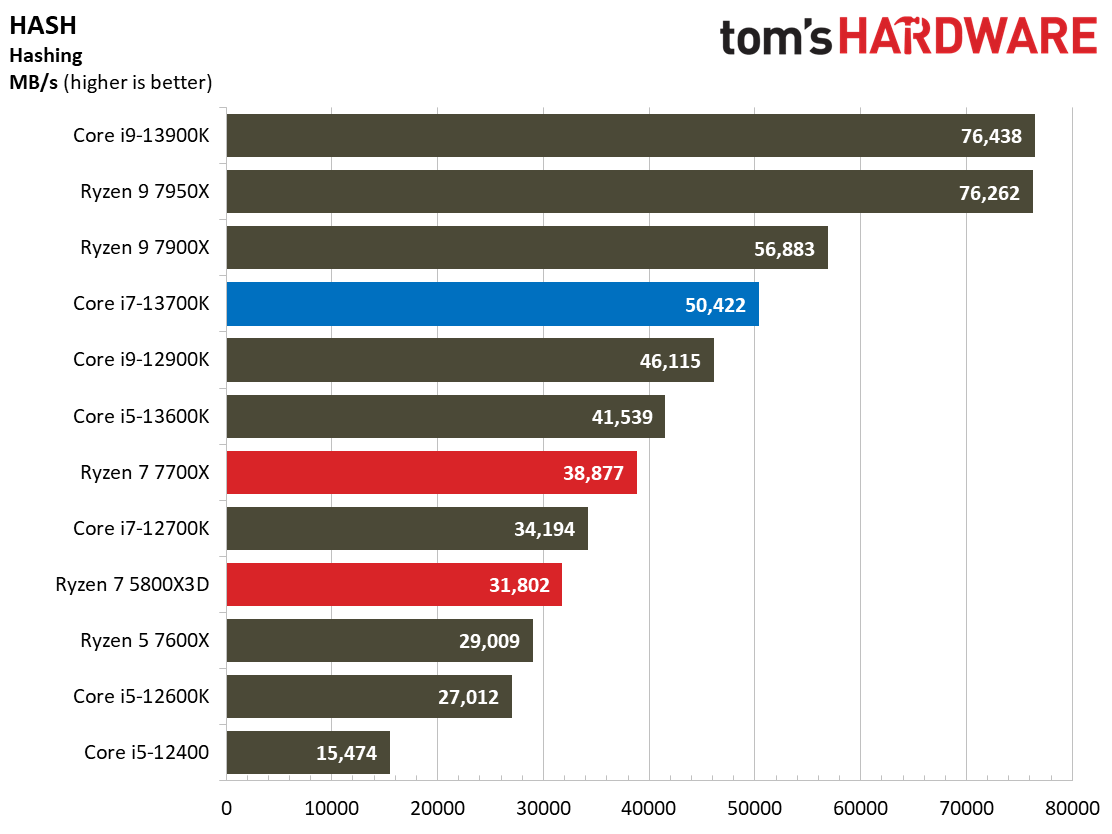
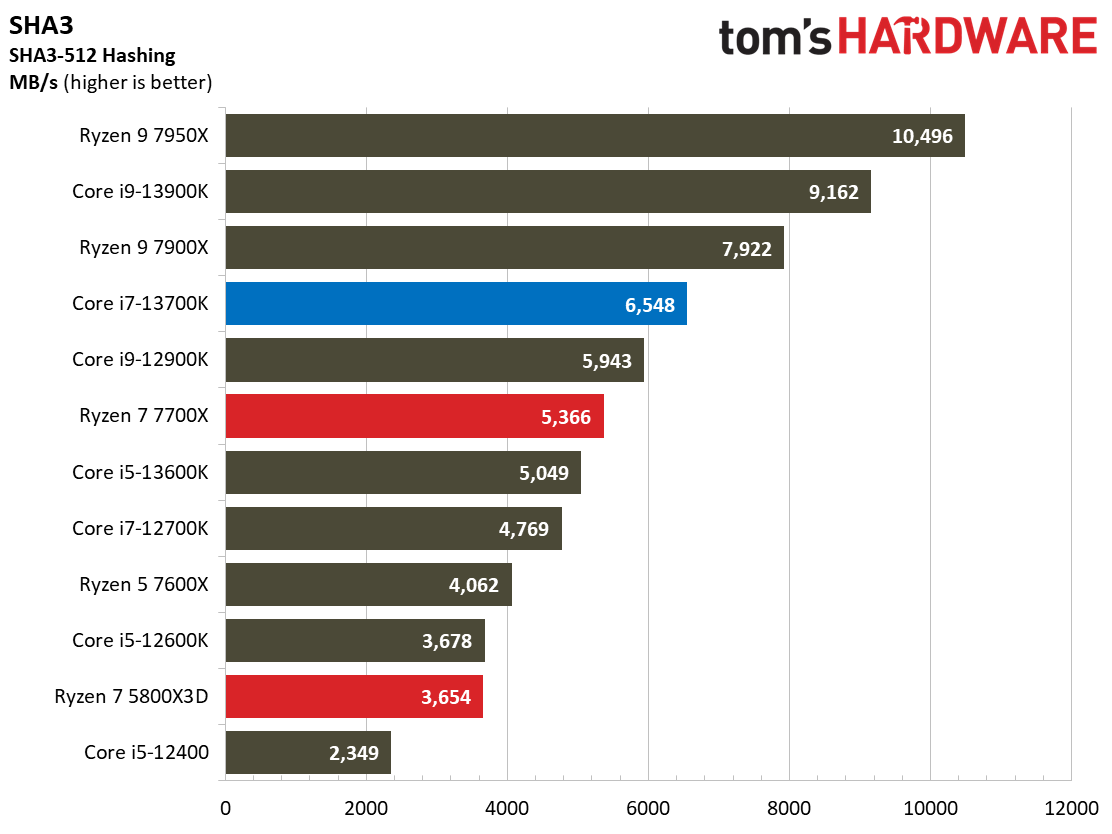
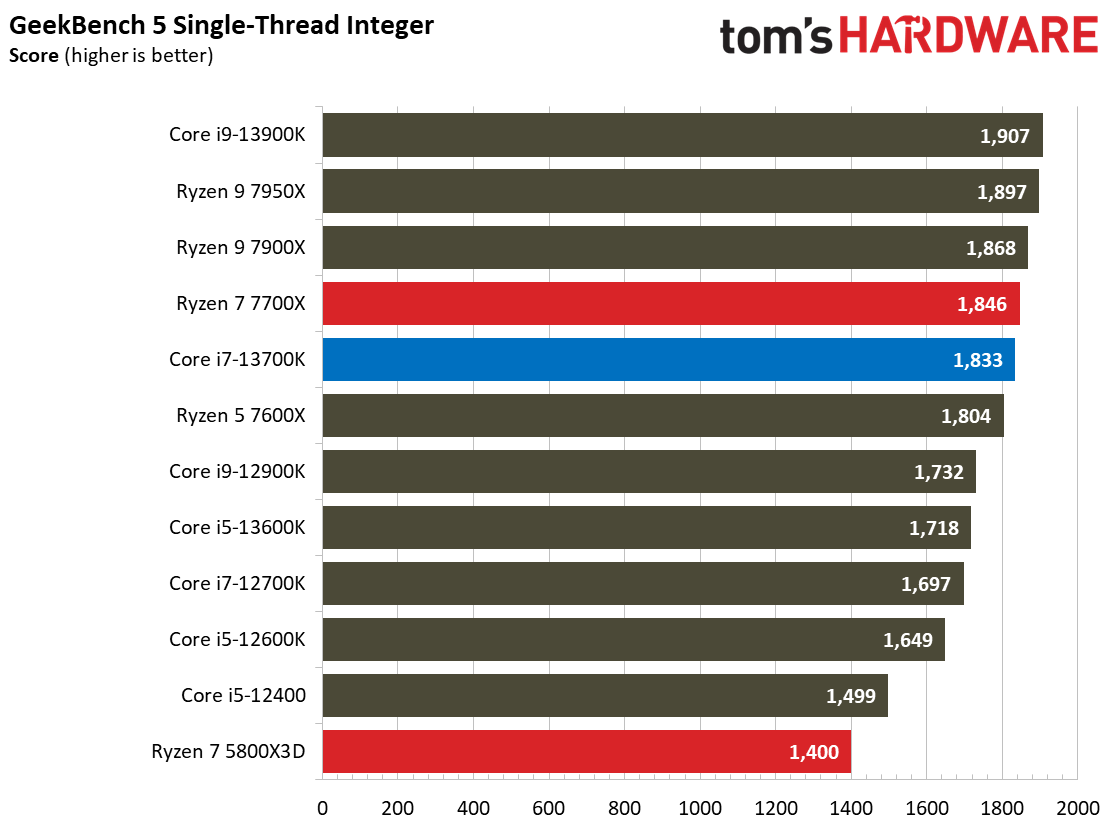
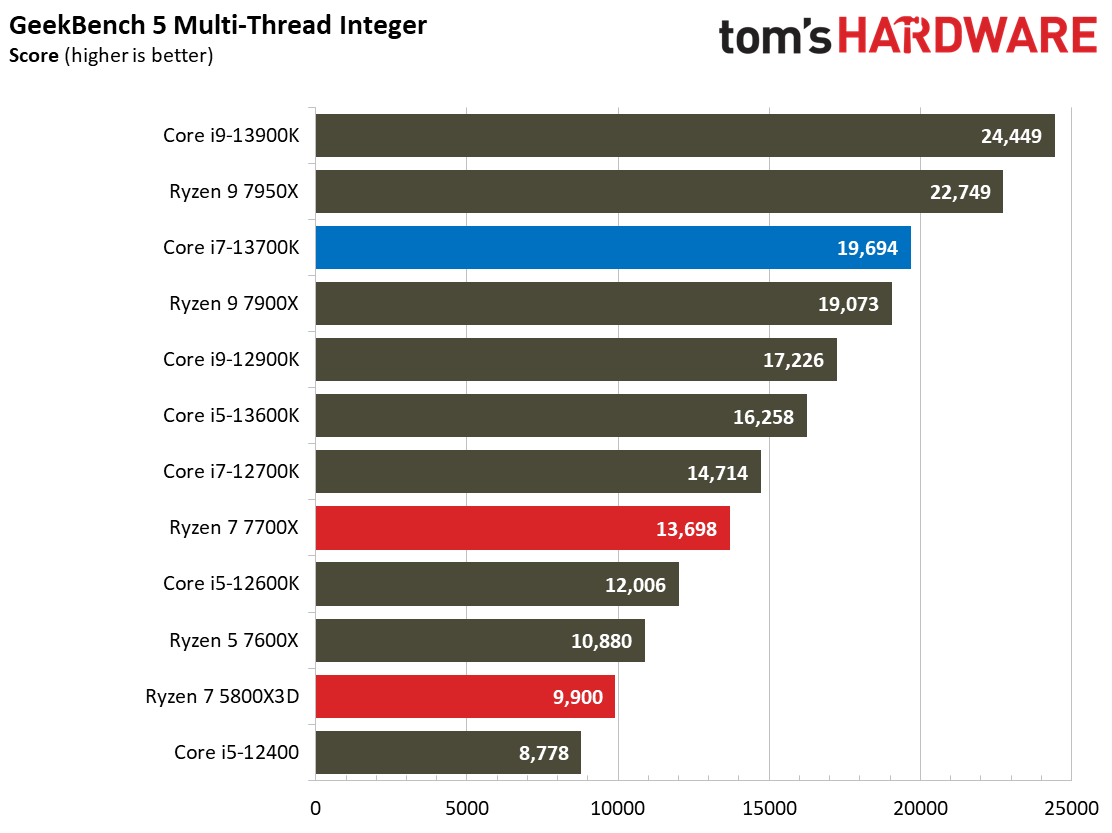
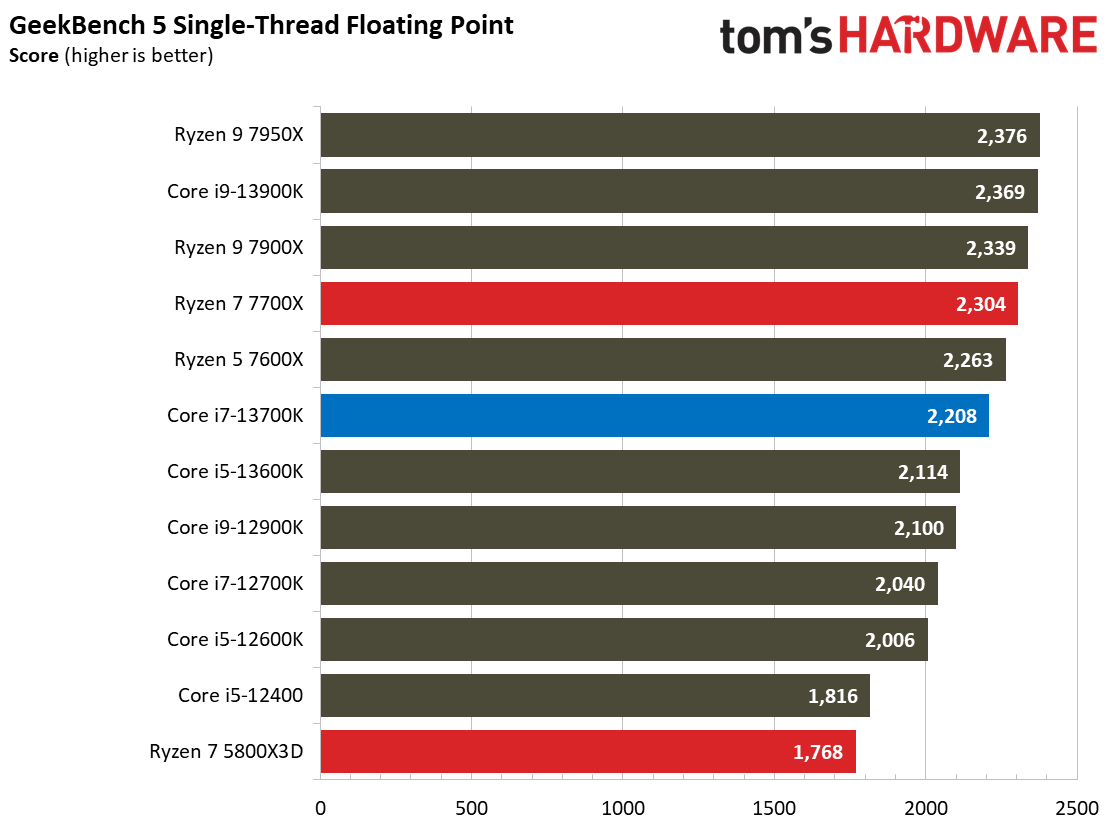
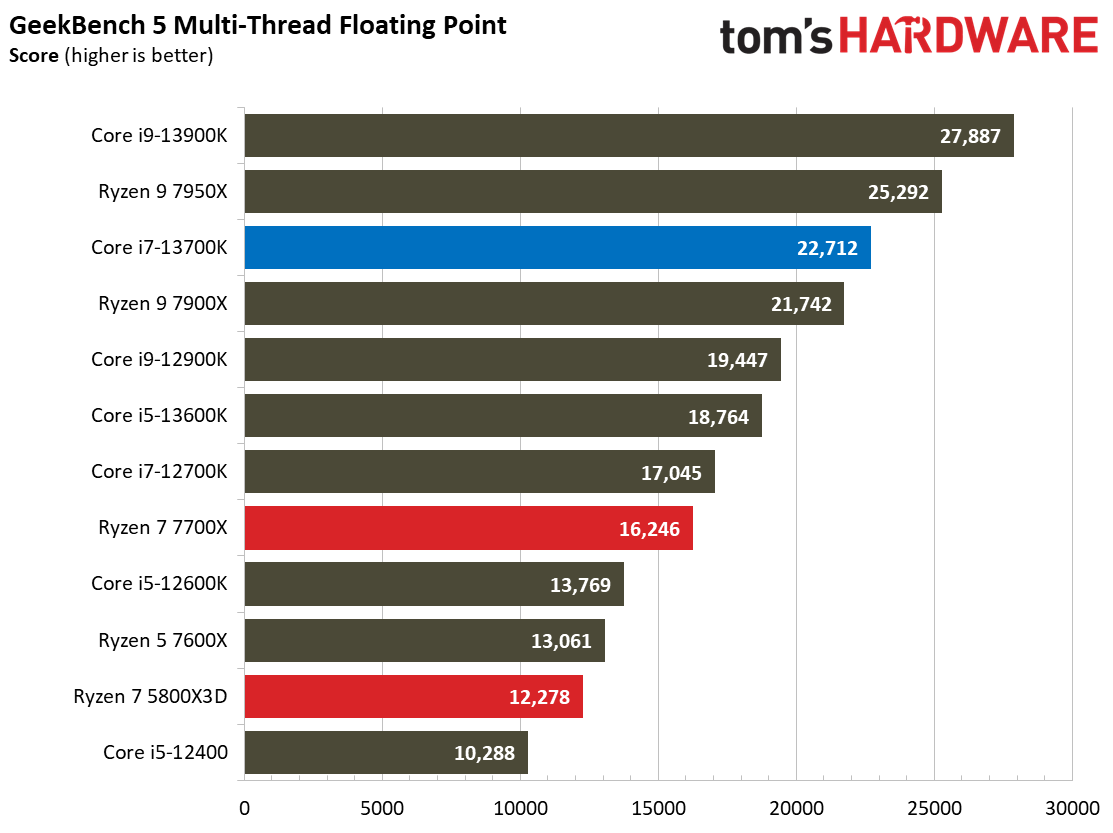
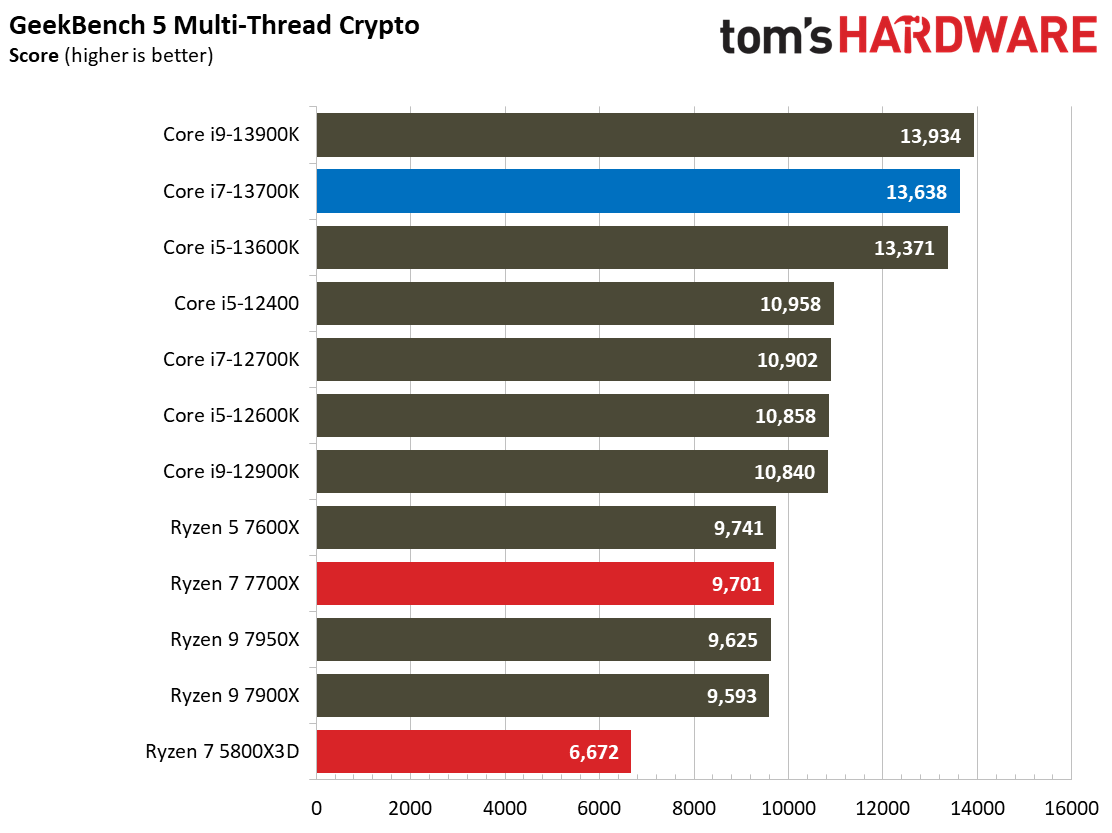
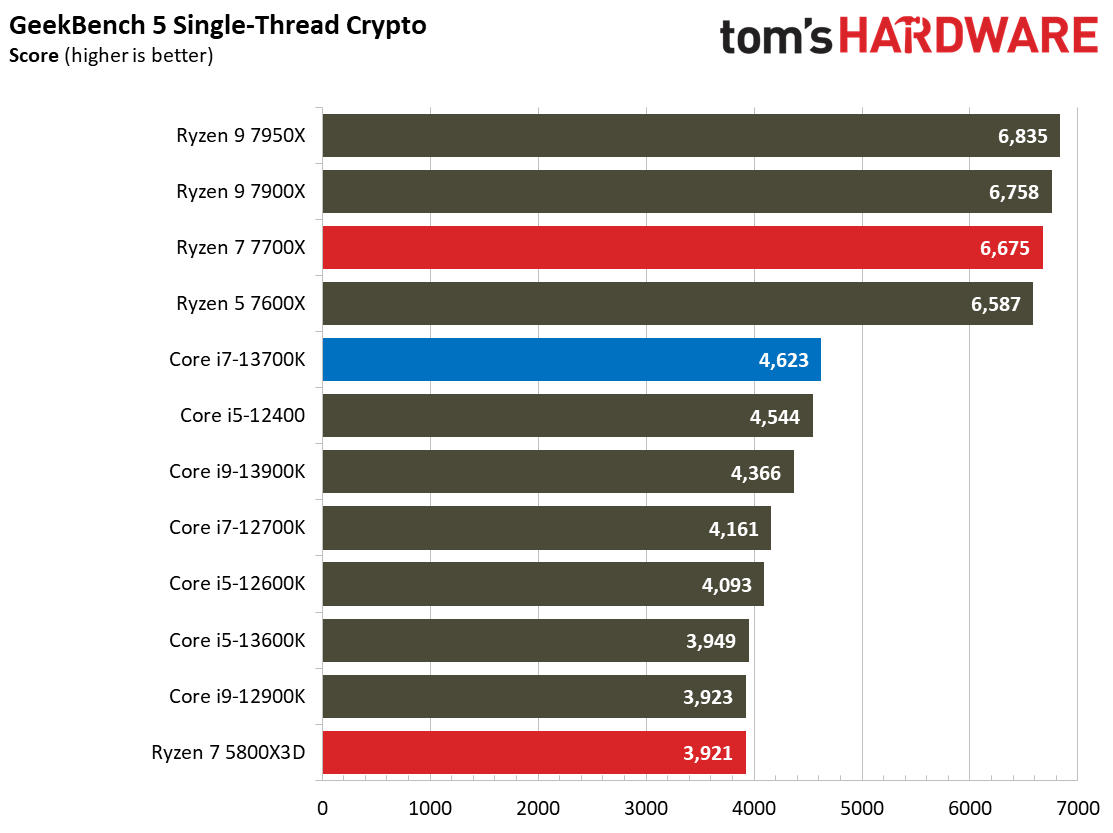
This selection of tests runs the gamut from the exceedingly branchy code in the LLVM compilation workload to the massively parallel molecular dynamics simulation code in NAMD to encryption and compression/decompression performance.
Y-cruncher computes Pi with the AVX instruction set, making for an exceedingly demanding benchmark. We employed the latest version of y-cruncher that has added support for Zen 4, and here we can see the benefits of AVX-512 become apparent in the single-threaded benchmark, as the Ryzen 7000 chips all lead. Spreading the workload out among the cores in the threaded portion of the y-cruncher test results in lower performance for the Ryzen 7 7700X, likely due to memory bandwidth and fabric limitations, thus handing the Core i7-13700K the win.
We’re accustomed to Ryzen displaying inconsistent performance in compression/decompression workloads, with decompression being a strength while compression suffered compared to other chips. The Zen 4 architecture makes big strides here, delivering a similar level of performance in both workloads. However, the Core i7-13700K takes a meaningful win in both types of work.
- MORE: AMD vs Intel
- MORE: Zen 4 Ryzen 7000 All We Know
- MORE: Raptor Lake All We Know
Current page: Productivity Benchmarks on Core i7-13700K
Prev Page Gaming Benchmarks Intel Core i7-13700K Next Page Taking the Shine off Core i9
Paul Alcorn is the Editor-in-Chief for Tom's Hardware US. He also writes news and reviews on CPUs, storage, and enterprise hardware.
-
brandonjclark It was such a good review I went and compared my 10900kf to the 13700k and was AMAZED to find them13700k is much more powerful, in every category. It's even more powerful in the multi threaded scoring.Reply
I have deep enough pockets that I'd still likely go for a core I9, but I'm just not in the market this gen. I think I'll wait for the core i9-15xxx series.
